 Furman University
2022 President’s Report
Furman University
2022 President’s Report
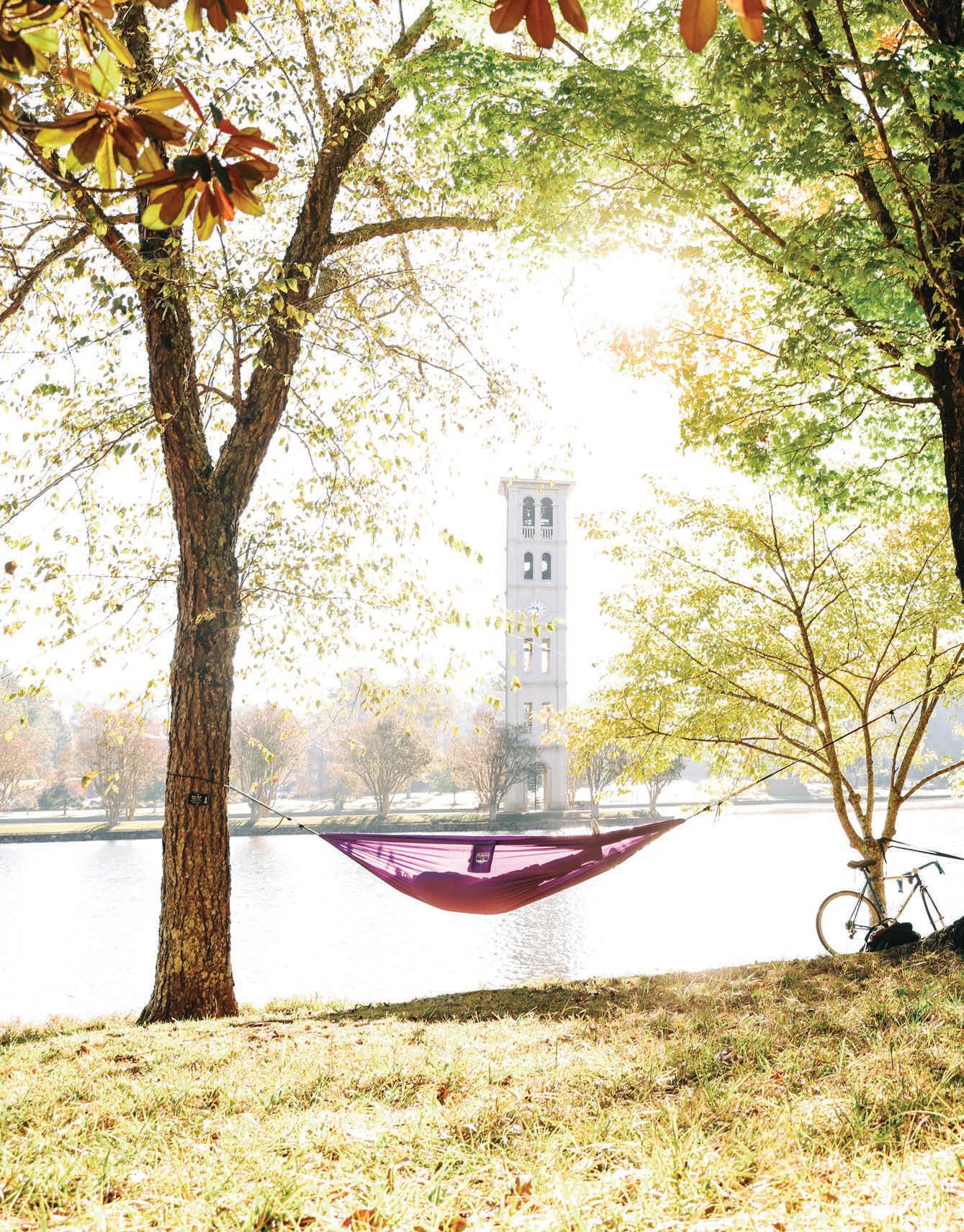
Furman University 2022 President’s Report

A Message from the President p. 4
The Furman Advantage .................p. 8
Defining Experiences p. 16
Inclusive Excellence p. 22
Excellence and Community ........ p. 28
The Change We Seek p. 32
With Every Mile p. 38
A World of Good .......................... p. 42
The Furman Band performs in 2020.
A MESSAGE FROM THE PRESIDENT
Finding your life’s purpose – your true, authentic calling – does not happen alone. It takes a community, a feeling that you belong, the space and opportunity to explore, and the guidance of mentors who encourage deep reflection.
With this in mind, our Pathways Program, a mentoring and peer advising curriculum, is now a graduation requirement. The onecredit course for each semester of a student’s first two years helps them to transition to college life and develop a sense of belonging on campus. At the same time, Pathways prepares students to fully realize the benefits of The Furman Advantage, Furman’s personalized four-year pathway to graduation, by helping to deliver the education they will need to have meaningful lives and careers in a world they will also help shape.
Before the faculty voted this past spring to offer Pathways to all students, we asked our students about their experiences at Furman. The survey results showed that those who were part of the pilot program reported being more satisfied with their advising experience than students who did not participate. The early data also suggest that Pathways helps students from low-income families, firstgeneration college students, and students of color by increasing their retention at Furman, so they stay enrolled through graduation. Pathways also improves participation in engaged learning experiences, such as internships, research and study away. Alongside all of this, the data suggest Pathways helps students think about the future; these students had earlier and more frequent appointments with career counseling.
From the work of the President’s Diversity, Equity and Inclusion Committee to support for firstgeneration students to Pathways’ carefully scaffolded approach to the first two years, we are sending a message to students: You are not alone. You are part of a community, one that is committed to helping you thrive in college, feel a sense of belonging here, and chart your path to a meaningful life.
Even as we focus our efforts on the student experience and success after graduation, we’re aware of the view from outside. In 2021, Furman received a $25 million grant from The Duke Endowment, bringing its total direct investment in The Furman Advantage, including Pathways, to $52.5 million. And Furman was again recognized for the excellence of our undergraduate experience. This fall, Furman’s national ranking improved, placing us at No. 45 in the U.S. News & World Report “Best Colleges” rankings. And for the sixth year in a row, Furman was named a “Most Innovative School” by our peers, ranking No. 4 in the category this year. We are pleased to see this recognition, but we know it is only one measure of the immense value of a Furman education.
In the lab or library or on a study-away trip or in mentoring sessions, Furman faculty and staff live out their commitment to students every day in ways too numerous to list. It is this support for student thriving, resilience, reflection and belonging that forms the architecture of the Pathways Program.
Central to this approach is the recognition that we must adapt to meet the shifting demands of our society and employment landscape. We know the needs of this generation of students are different from those of previous generations – because the world and its challenges constantly change.
As you will see in the pages of this report, we’ve pushed forward to meet the challenges of our mission – from our commitment to inclusive excellence, as we strive to create an institution reflective of society, to our focus on immersive, engaged learning, to our deep ties with the surrounding community. Each is crucial to providing the educational experience our students require to become engaged and responsible citizens.

4 PATHWAYS
 President Elizabeth Davis
President Elizabeth Davis
FURMAN UNIVERSITY
attracts students and faculty from around the world. It’s easy to understand what draws them. Furman regularly receives accolades for academic and teaching excellence and is consistently listed among the nation’s best colleges. The Princeton Review again named Furman one of the nation’s most environmentally responsible colleges, and this past fall was the third time running that the university earned a Sustainability Tracking, Assessment and Rating System (STARS) gold rating from the Association for the Advancement of Sustainability in Higher Education, ranking Furman among the top three baccalaureate schools in the nation.
Our 750-acre campus, located at the foot of the Blue Ridge Mountains, is famous for its natural and architectural beauty and abundant outdoor opportunities. But Furman is also known as Greenville’s hometown university, linking us to one of most dynamic hubs for culture, arts, business and innovation in the nation and the No. 5 city on Condé Nast Traveler’s “Best Small Cities in the U.S.”
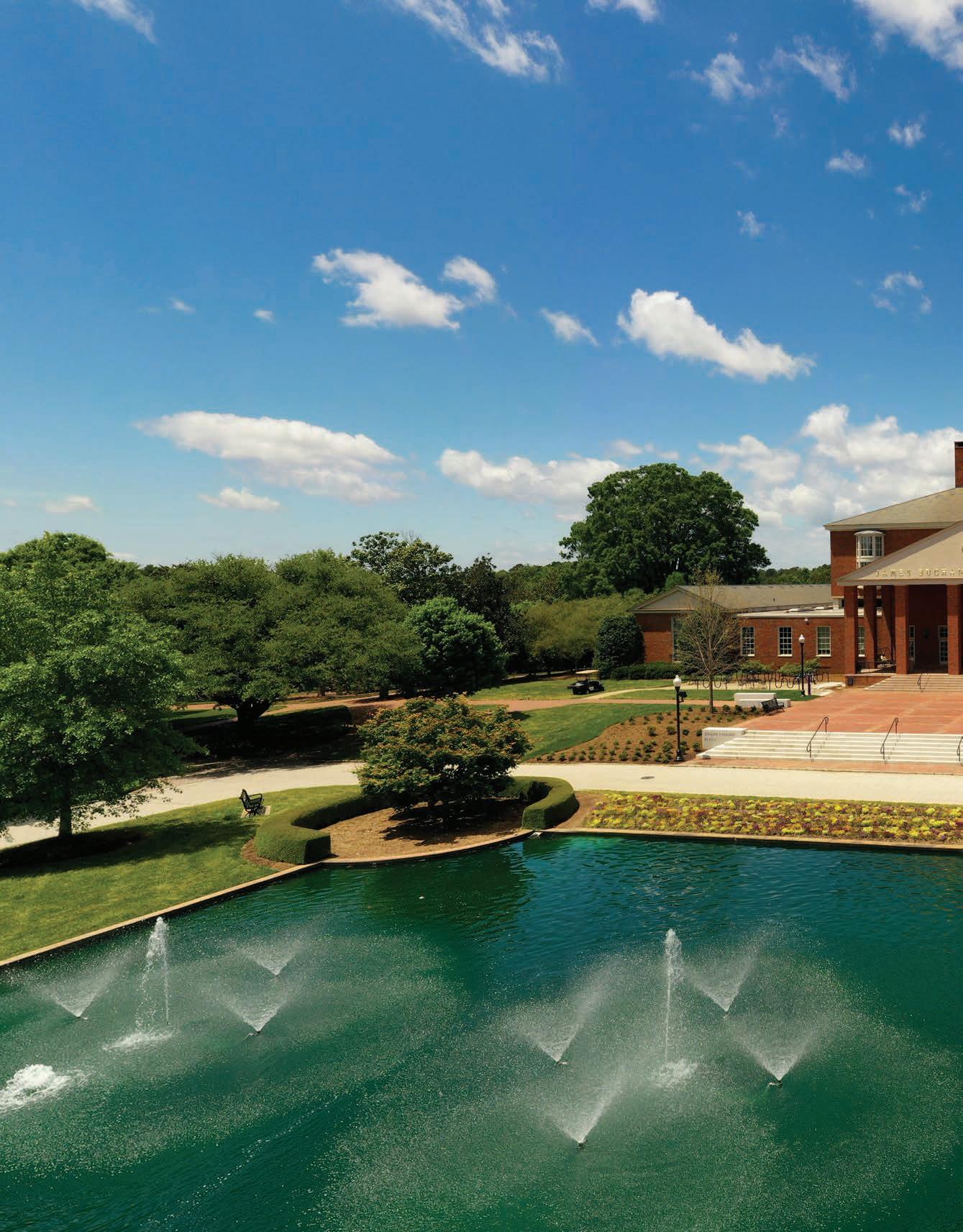
#16
BEST QUALITY OF LIFE
The Princeton Review
# 4
NATIONAL LIBERAL ARTS COLLEGE IN THE SOUTHEAST
U.S. News & World Report
# 31 UNDERGRADUATE RESEARCH/CREATIVE PROJECTS (among all universities) U.S. News & World Report
# 32
FIRST-YEAR EXPERIENCE (among all universities) U.S. News & World Report
#45 National Liberal Arts Colleges
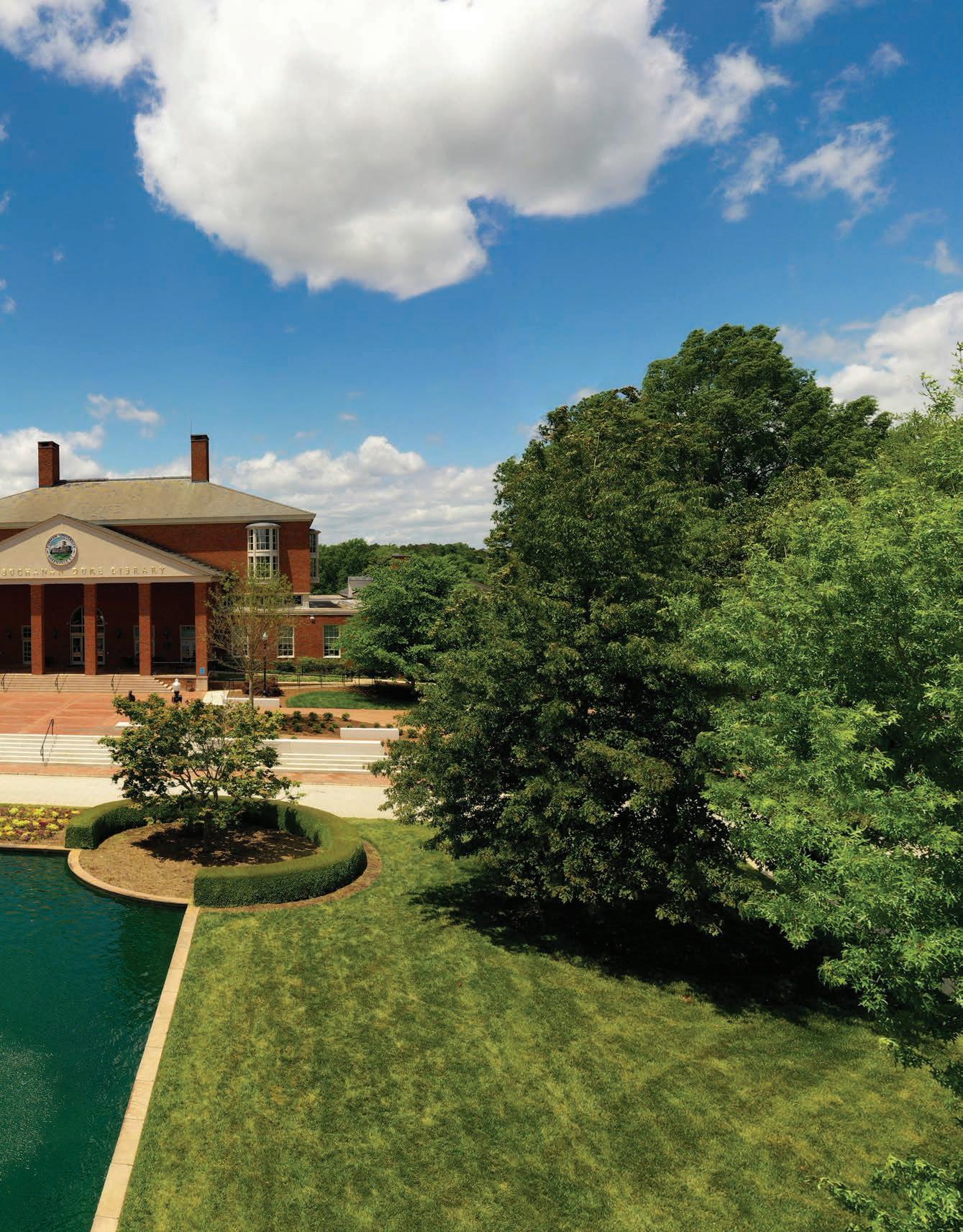
#
Forbes – America’s Top Colleges #4 U.S. News & World Report PATHWAYS 7
38 Top Liberal Arts Colleges
U.S. News & World Report
 Michelle Horhota, Associate Dean for Mentoring and Advising, Professor of Psychology
Michelle Horhota, Associate Dean for Mentoring and Advising, Professor of Psychology
“ Exposing students to possibilities while they are undergraduates gives them a more concrete idea of what they want to do. At graduation, they have a better sense of how what they have learned at Furman informs what they want to do next, and the steps they need to take to get there.”
MICHELLE HORHOTA Associate Dean for Mentoring and Advising, Professor of Psychology
PATHWAYS 9
THE FURMAN ADVANTAGE
The Furman Advantage is a four-year journey connecting classroom learning, mentoring and advising, engaged learning, and post-graduation exploration and preparation, calibrated year by year to support each students’ development and goals. The journey begins with Pathways.
The foundational two-year Pathways Program emphasizes mentoring and advising and helps to ease the transition to college. Students take a one-credit hour course each semester for their first two years at Furman. (This past March, the faculty voted to extend Pathways, which had been a pilot program, to all incoming Furman students.)
Pathways plays an important role in not only student success but the university’s success. Gallup has found that belonging, institutional trust, purpose and postgraduation preparation increase affinity, with belonging identified as the most
powerful factor in a student’s likelihood to recommend their school to others. Furman’s Pathways Program reinforces these elements through its curriculum.
“Throughout the first two years, our hope is that students will hear a common Pathways language and hear similarly themed discussions across campus offices, creating a seamless four-year experience. The idea of scaffolding extends throughout. What are we building? The opportunity for a meaningful career and a life of purpose for all students.”
MICHELLE HORHOTA

“I can confidently state that the proposed program would be highly valuable to the students of Furman University and is positioned to be a standard of best practice and provide leadership in the field for (the first-year experience), sophomore programs, and implementation of HIPs (high-impact practices).”
JENNIFER R. KEUP , executive director of the National Resource Center for the First-Year Experience and Students in Transition at the University of South Carolina
10 PATHWAYS
2022 Prisma Cancer Institute summer intern Yaseen Echekki ’25 with Randy Hutchison, an associate professor of health sciences.
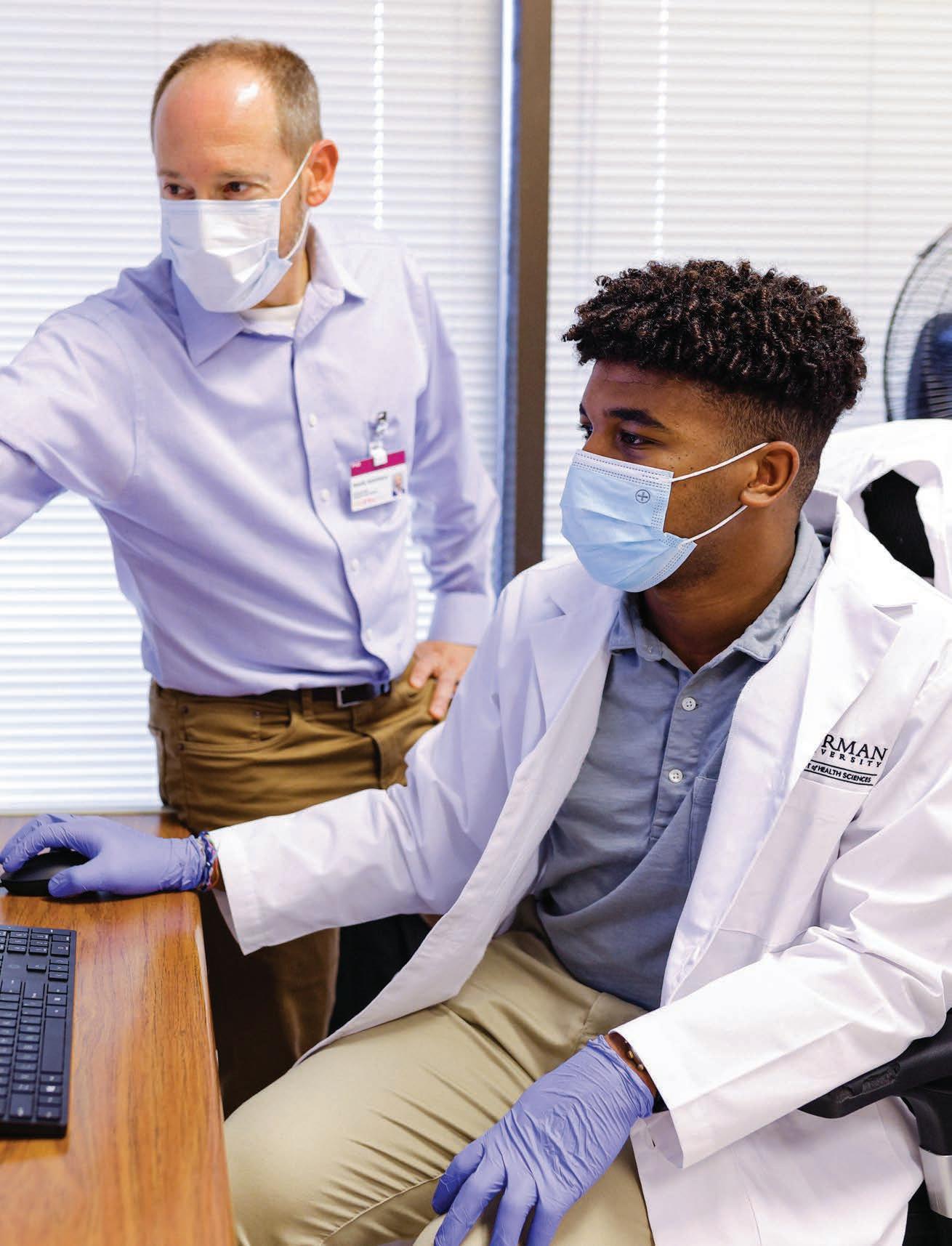
FOR FIRST-YEAR STUDENTS
Students meet with their Pathways class, their advisor and a peer mentor each week for 50 minutes. The curriculum focuses on transitioning to college by building a foundation of selfawareness and reflection, helping students learn who they are, what they value and what captures their interest, while also guiding students on time and stress management, study strategies and academic integrity. Students also learn about Furman’s history, including major milestones and pioneers such as Joseph Vaughn ’68, the first Black undergraduate student to attend Furman.
Additional support
This past spring, Furman received a National Science Foundation S-STEM (Scholarships in STEM) grant, which the university has used to develop Pathways in STEM Success – The First-Year Experience, a cohort-based program for students interested in science, technology, engineering and mathematics. The program includes an eight-day pre-college bridge component called SAFE Passage, a customized peer-based curriculum, a Pathways class section with an advisor and a peer mentor in the sciences, and access to research, study away, internships and other engaged learning tools. The program emphasizes identity, belonging, and personal resilience and success identified through signs of flourishing, such as recovery from mistakes and comfort with seeking academic help.
FOR SOPHOMORES
The Pathways course encourages students to think about how to integrate their academics, their engaged learning experiences – such as study away, research and internships – and their career goals. They build résumés, have informational interviews with alumni and learn other basic career skills. Themes of leadership, purpose, active citizenship and impact arise as students learn how to tell their stories by articulating personal strengths and experiences. Students may declare a major at any point during the first two years of their pathway. When they do, students obtain a major advisor in addition to their Pathways advisor, growing their dedicated team of mentors.
THE FINAL TWO YEARS
Juniors and seniors continue their pathway at the department level, tailoring their learning to their specific majors and building on information they learned during their Pathways years. Through their major, students reflect on what they’re learning and how it positions them for life after Furman, whether in the workforce or graduate school. Juniors and seniors can participate in career treks, panels and fairs; alumni networking; and pre-professional advising in law and health care. Students may also connect with Furman’s institutes through their departments. Career skills and reflection are integrated into coursework and co-curricular opportunities.
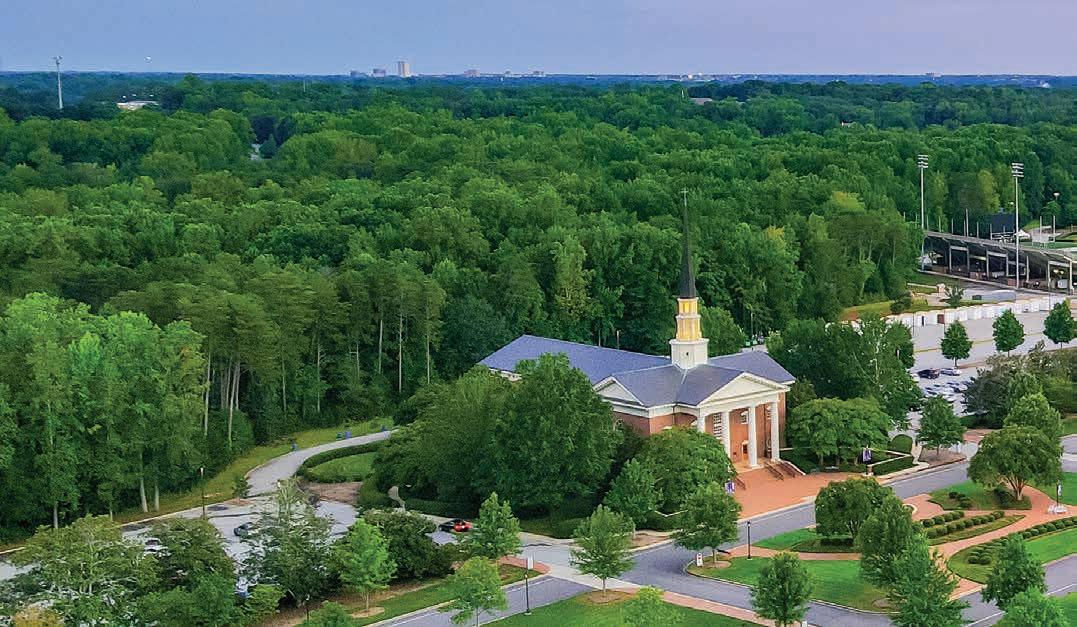
President Elizabeth Davis launched The Furman Advantage in 2016 with an initial grant of $25 million. In 2017, The Duke Endowment provided $2.5 million for Furman to partner with Gallup to help assess its impact. After a second grant of $25 million in March of 2021, The Duke Endowment’s direct investment in The Furman Advantage has reached $52.5 million.
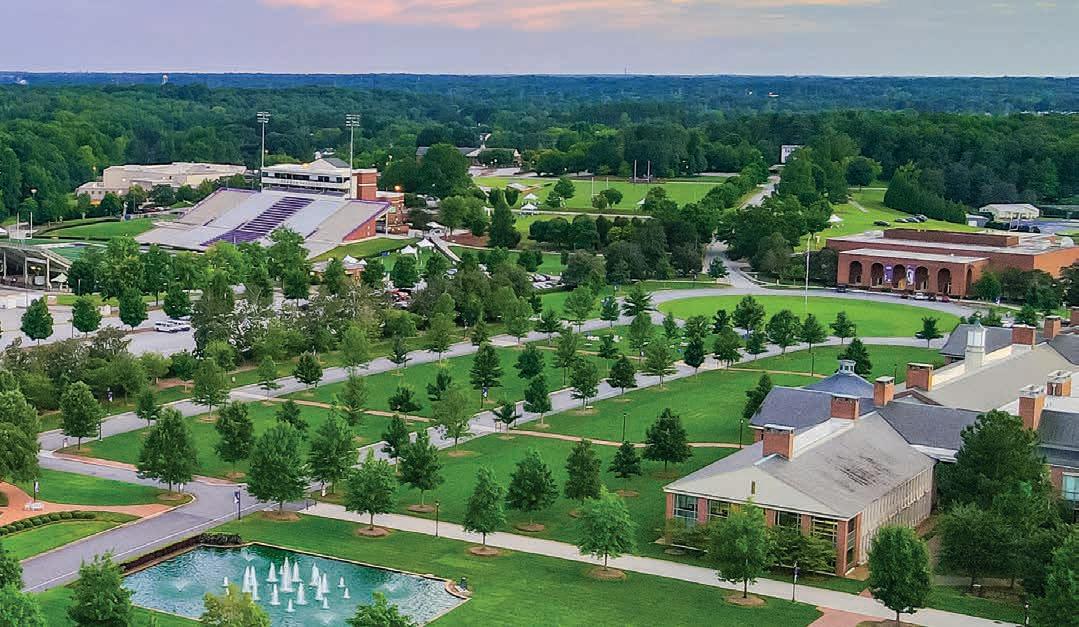 © 2022 Furman University
© 2022 Furman University
13

14 PATHWAYS
Class of 2022 graduates celebrate Commencement.

TOP EMPLOYERS OF THE CLASS OF 2021
AMAZON
AMERICORPS
APPLE
BANK OF AMERICA
BARINGS
BLACKBAUD
CAPGEMINI
DELOITTE
ELLIOTT DAVIS, LLC
ESRI
FEDERAL RESERVE BANK
GREENVILLE COUNTY SCHOOLS
IBM
JET PROGRAM USA
JP MORGAN CHASE & CO.
MICHELIN
NORTHWESTERN MUTUAL
PRICEWATERHOUSECOOPERS
PROJECT HOPE FOUNDATION
SCANSOURCE
SCRIBEAMERICA
SPACEX
ST. JUDE CHILDREN’S RESEARCH HOSPITAL
TD SYNNEX
THE PUBLIC INTEREST FELLOWSHIP
U.S. HOUSE OF REPRESENTATIVES
WAYFAIR
WELLS FARGO
95% POST-GRADUATION SUCCESS
SAMPLING OF GRADUATE SCHOOLS
AMERICAN UNIVERSITY
BOSTON UNIVERSITY
CLEMSON UNIVERSITY
CORNELL UNIVERSITY
DUKE UNIVERSITY
EMORY UNIVERSITY
FURMAN UNIVERSITY
GEORGE WASHINGTON UNIVERSITY
JOHNS HOPKINS UNIVERSITY
LONDON SCHOOL OF ECONOMICS
MEDICAL UNIVERSITY OF SOUTH CAROLINA
NEW YORK UNIVERSITY
NORTH CAROLINA STATE UNIVERSITY
OHIO STATE UNIVERSITY
PRINCETON UNIVERSITY
UNIVERSITY OF ALABAMA
UNIVERSITY OF CAMBRIDGE
UNIVERSITY OF FLORIDA
UNIVERSITY OF GEORGIA
UNIVERSITY OF MICHIGAN
UNIVERSITY OF NORTH CAROLINA
UNIVERSITY OF SOUTH CAROLINA
UNIVERSITY OF TEXAS
UNIVERSITY OF VIRGINIA
VANDERBILT UNIVERSITY
WAKE FOREST UNIVERSITY
GRADUATES EMPLOYED, ENROLLED OR PARTICIPATING IN SERVICE (6 months after graduation)
EMPLOYED: 49%
CONTINUING EDUCATION: 35%
CONTINUING EDUCATION AND EMPLOYED: 4%
INTERNSHIP: 4%
VOLUNTEER/SERVICE/MILITARY: 3%
SEEKING EMPLOYMENT: 5%
PATHWAYS 15
“Dr. Shields has helped me thrive at Furman since the very beginning. Starting out as my intro chem professor, he allowed me to see just how cool chemistry can be. He has taught me so much more about the vast nanoscopic world hidden right in front of us.”
CONOR BREADY ’24
Conor Bready ’24, an applied mathematics and chemistry major, was named a 2022 Beckman Scholar by the Arnold and Mabel Beckman Foundation, and also a Goldwater Scholar this year. His faculty mentor is Professor of Chemistry George Shields, who won the 2022 Faculty Mentor Award from the Council on Undergraduate Research and the Barry Goldwater Scholarship and Excellence in Education Foundation.
16 PATHWAYS
DEFINING EXPERIENCES
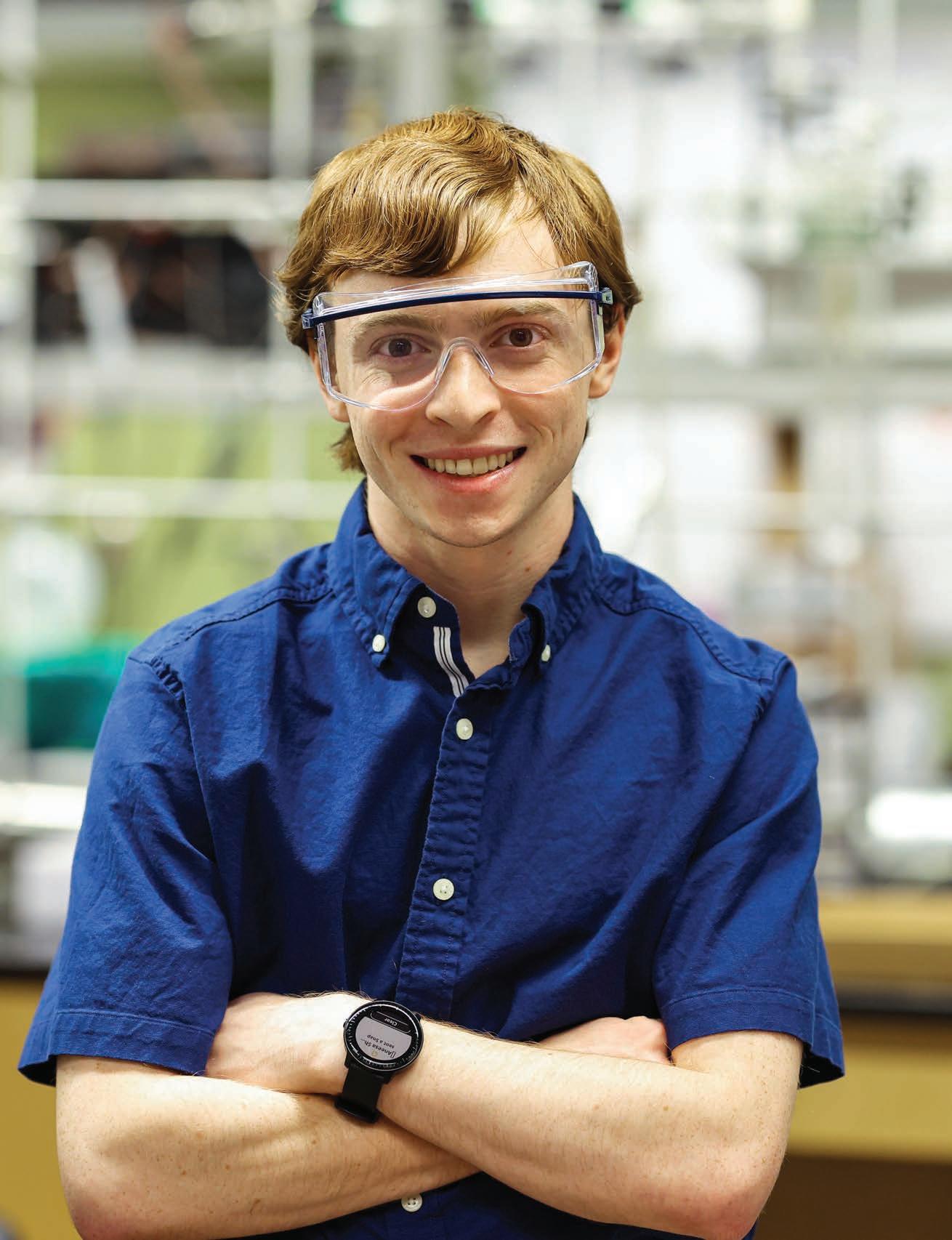
DEFINING EXPERIENCES
Engaged learning experiences are powerful guideposts along a student’s pathway – with each experience directing, informing and encouraging students to reflect on how far they have come and to consider the opportunities ahead.
The Center for Engaged Learning connects Furman students with experiences that align with their interests, so that each student has had at least one engaged learning experience through an internship, study away trip or mentored research project. The center also helps to remove barriers to these purpose-defining experiences by providing fellowships for summer research and internships, and need-based scholarships for study away. All these activities prepare students for careers or graduate school, as they follow the academic, professional and personal pathway shaped by mentoring, reflection and these immersive engaged learning experiences.
The way Furman guides students to approach learning and life is intentionally integrated into The Furman Advantage framework. The transformational learning and mentoring offered to each student during their Furman career is clearly reflected in the purposeful lives they pursue after graduation.
Pathways and possibilities
How does a conservative’s sense of humor differ from a liberal’s comedic sensibility? What if a mental health patient’s moods could be regulated with one medication rather than many? What strengths and skills are needed to answer a crisis hotline?
These were just some of the questions that arose during the 14th annual Furman Engaged, the university’s campus wide engaged learning event. The daylong celebration took attendees from the stage to the field and from the lab to the community, as 700 students presented on their engaged learning experiences and reflected on their pathways. Student presenters also helped first- and second-year students envision their own potential pathways by showing them the kinds of opportunities that are possible at Furman.
The May Experience term took students to the Naples, Florida, headquarters of medical device company Arthrex to learn about careers in the biomedical field, from sales to bioengineering, surgery and operations.
700 STUDENTS PRESENTED ON THEIR ENGAGED LEARNING EXPERIENCES AND REFLECTED ON THEIR PATHWAYS.
18 PATHWAYS
79% HAD AT LEAST ONE PROFESSOR AT FURMAN WHO MADE THEM EXCITED ABOUT LEARNING

73% HAD AN INTERNSHIP OR JOB THAT ALLOWED THEM TO APPLY WHAT THEY WERE LEARNING IN THE CLASSROOM
–Senior Survey results for the Class of 2022
Community engaged medicine graduate student Drew Singerman ’21 discusses with Professor of Chemistry Paul Wagenknecht his work at a chemistry department poster presentation.
83% REPORTED HAVING AN ENGAGED LEARNING EXPERIENCE AT FURMAN etc.
MayX courses also covered beginner medical Spanish, campus entomology, the next generation of board games, and the university’s historical connections to slavery.
Undergraduate research
Our nationally recognized program, supported by the Office of Undergraduate Research, the Office of Integrated Research in the Sciences, and academic departments and offices throughout campus, offered students the same breadth and depth of research topics as previous years. Furman’s undergraduate research program is known for its high success rate in capturing competitive federal grants, national awards for both students and faculty and student-faculty co-authored publications in prominent, peer-reviewed journals. In Summer 2022, students and faculty mentors returned to predominantly in-person experiences after disruption by the pandemic in recent years.
The number of students and faculty who do summer research together has steadily increased since the program began in 1966. And although the numbers decreased slightly from 2021, there were 242 research fellows working with 87 faculty members in Summer 2022.
Study away
Connecting students with study away programs that suit their goals, the Rinker Center for Study Away and International Education helps students develop deep cultural insights, better intercultural communication skills, curiosity and the self-confidence to live in a global society.
Despite the challenges of the pandemic, 437 students took advantage of study away opportunities. During fall and spring semesters, 173 students studied away on a semester-long program – primarily in major Western European cities that
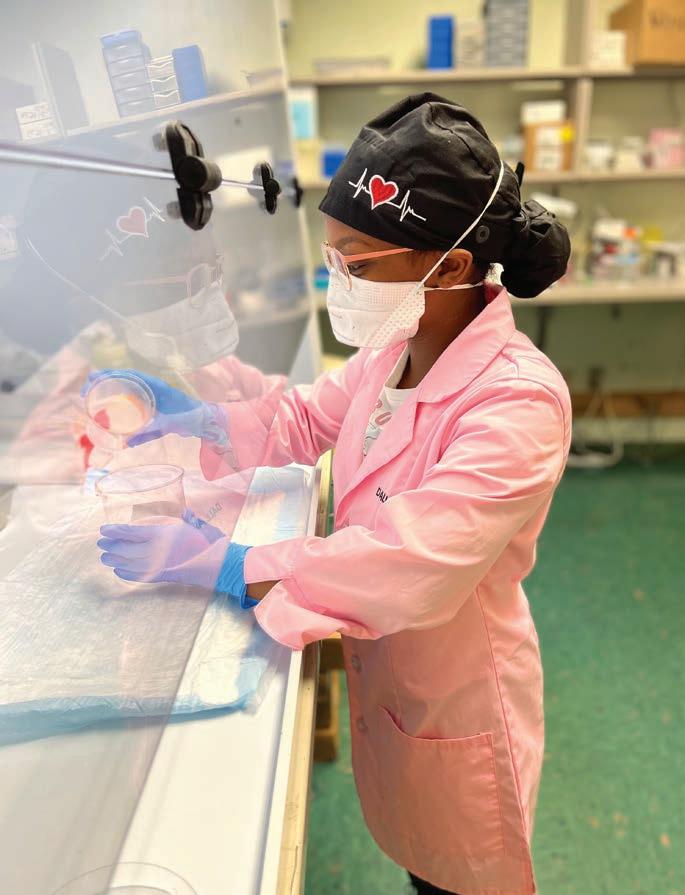
included Barcelona, Berlin, Dublin, Madrid, Paris and Vienna, but also in Washington, D.C. – with a study abroad organization that met Furman’s safety and risk management standards.
This past May, 251 students took part in the 16 faculty-led MayX programs, including visits to western Europe as well as Ghana, Israel, Turkey and several locations in the United States. While participation for MayX decreased by 30%, the program continued, thanks to measures designed to minimize coronavirus risks. Thirteen students participated in the faculty-led summer internship study away program in Washington, D.C., during which students undertake a 30-hour-per-week internship along with two classes.
20 PATHWAYS
Dallas Shuman ’25 conducts neuroscience research.
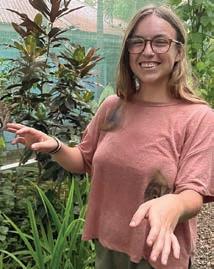
“Coming to Furman, I was clueless about what my future held, unable to imagine myself in a career or even to choose a major. That was until I was introduced to sustainability science, a discipline that has allowed me to develop my passion for both people and the environment simultaneously.”
The Internship Office
The Center for Engaged Learning’s Internship Office helps students secure yearround competitive opportunities designed to advance their academic and professional interests. Through a host of services, such as resume coaching and interview preparation, job shadowing and introductions to key alumni, the office instills in students the professionalism, self-direction, social responsibility and strong work ethic they will need to thrive in their internships and future careers.
This past academic year, the office held more than 760 meetings with 507 students, of which 20% were from underrepresented groups. The center staff also delivered 57 presentations to more than 1,334 students. Further helping students extend their pathways toward career prospects, the office formed new relationships with 91 employers – including Samsung, the Bipartisan Policy Center, and Michelin Business Intelligence – which contributed some of the 107 new internship opportunities.
The office also re-introduced the Freeman Fellowship for the first time since 2019, sending eight students to intern in Southeast Asia for the summer. The Summer Fellowship, meanwhile, supported 206 students as summer intern fellows by funding reduced-rate campus housing and allowing their summer experience to be listed on their transcripts.
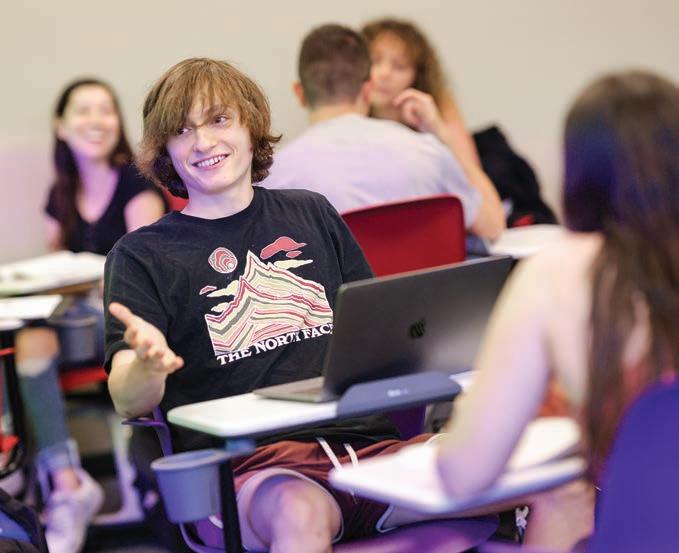
251
STUDENTS TOOK PART IN THE 16 FACULTY-LED MAY EXPERIENCE STUDY AWAY PROGRAMS
PATHWAYS 21
Andrew Chinn ’25 participates in Beginner Medical Spanish, a May Experience class.
MAGGIE ATCHLEY ’23 visits a butterfly garden during her sustainability research in Costa Rica.
INCLUSIVE EXCELLENCE
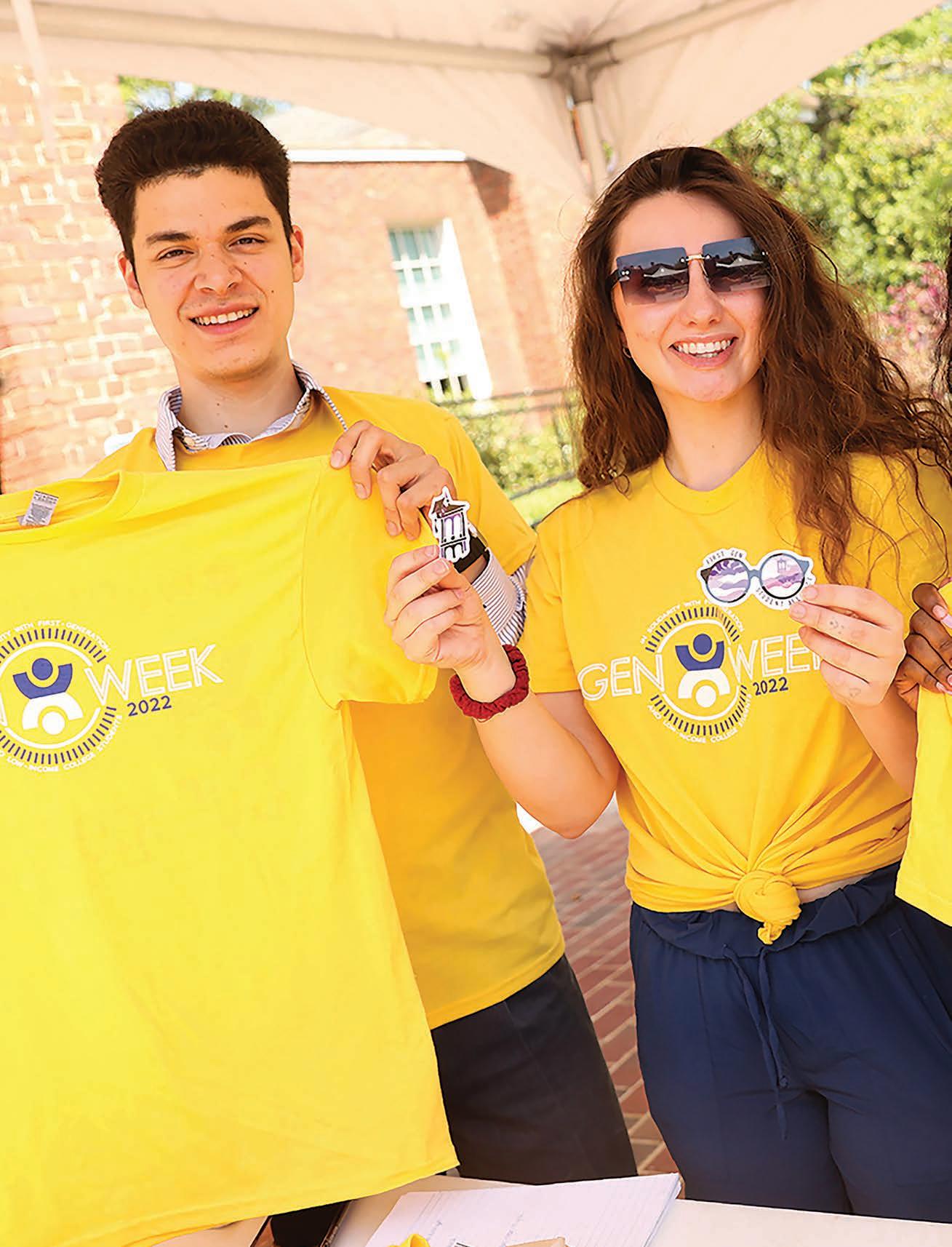 From left: Oscar Guillen Arauz ’22 and Emily Miller ’22 celebrate being first-generation students during Furman’s first-generation and low-income students GEN Week in April. The week was observed nationally across many universities dedicated to celebrating first-gen pride and raising awareness and visibility of first-gen, low-income students.
From left: Oscar Guillen Arauz ’22 and Emily Miller ’22 celebrate being first-generation students during Furman’s first-generation and low-income students GEN Week in April. The week was observed nationally across many universities dedicated to celebrating first-gen pride and raising awareness and visibility of first-gen, low-income students.
“We (First-Generation Low-Income Students) are reclaiming our identity from administrators and institutions, or the compartmentalization of the identity. We are reclaiming the mantle of what it means to be FGLI and to have pride in this identity.”
EMILY MILLER '22 President of the Furman First-Generation Student Alliance
PATHWAYS 23
INCLUSIVE EXCELLENCE
Our students’ pathways are guided by a community of diverse mentors, the opportunity to reflect on their identity and interests, and a sense of being welcomed and accepted.
One way Furman fosters belonging is by creating a sense of community at a critical transition time in a student’s pathway, their first year. This spring, the university broke ground on a comprehensive renovation of the South Housing complex that will include building a new residence hall and updating four others devoted to first-year students. This residential village will offer new personal, social and learning spaces for students to connect with faculty, staff and one another, setting students’ trajectories for success. The design will also provide abundant space for the Center for Inclusive Communities, which will move from the Trone Student Center, to grow initiatives and programs that promote student success through inclusion.
Like every year, the past year’s campus programming brought rich opportunities for students to develop their empathy, curiosity and understanding of diversity, equity and inclusion. One Cultural Life Program, “Breathing New Life into Old Treaties: Contemporary Enforcement of Native American Treaties,” examined the U.S. government’s legal interactions with Native American tribes. Another CLP offering was a yearlong series under the theme, “Women and Gender in World History.” Students also explored historical sites in Birmingham, Montgomery and Selma, Alabama, during a visit to the Civil Rights Trail. In the spring, students attended presentations such as “Beyond ABCD: A Desi American Story,” “Creating Home on Both Sides of the Pacific Ocean: The Archeology of Old Chinatowns & New Villages” and “Voices of Africa,” in
which African students presented on the distinctness of their homelands.
A May Experience course on the “Seeking Abraham” tour gave students a deeper awareness of Furman’s connection to slavery and the legacies of racism. The course was one recommendation of Furman’s Task Force on Slavery and Justice, which created a report and recommendations to tell a fuller, more accurate history of the university and to recognize the contributions of Black Americans to Furman’s founding and success. Among many other recommendations, the task force’s “Seeking Abraham” report called for renaming or placing contextual signage at campus sites.
Where we are, where we aspire to be
In Fall 2021, Furman conducted a campus climate assessment to measure the university’s progress in diversity, equity, inclusion and belonging and to support the university’s broader goal of inclusive excellence. Climate surveys help universities understand perceptions and perspectives of an academic organization and the degree to which students and employees feel a sense of engagement and belonging.
Anita Davis, vice president for diversity, equity, and inclusion at Trinity College, led the assessment, while the Higher Education Data Sharing Consortium administered the survey. Davis and her team also conducted focus groups, whose feedback was included in the data analysis. In April 2022, Davis and her colleague, Kelly Weeks of Rhodes College, returned to Furman and reported their
24 PATHWAYS
2021 International Student Orientation
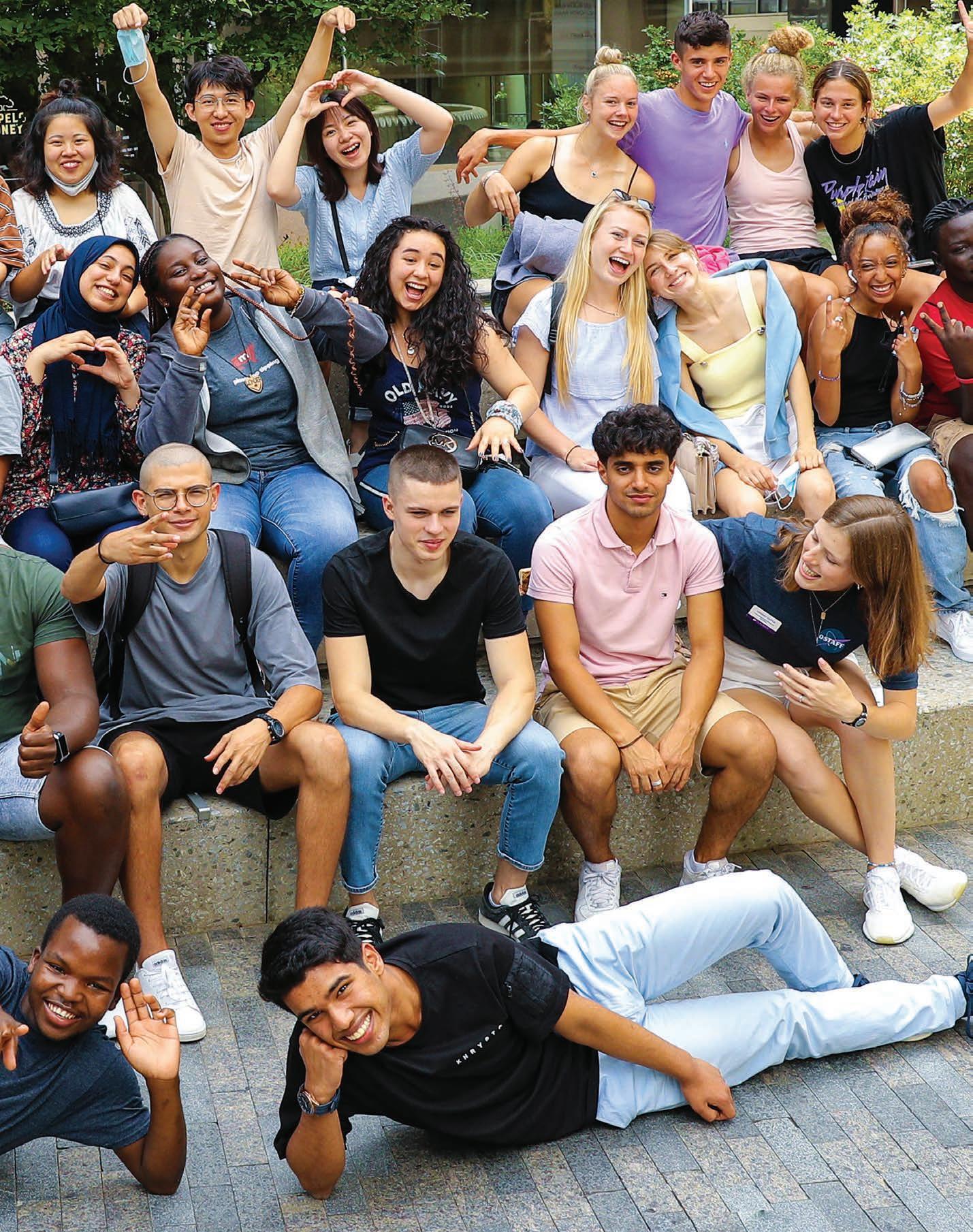
35
COUNTRIES REPRESENTED
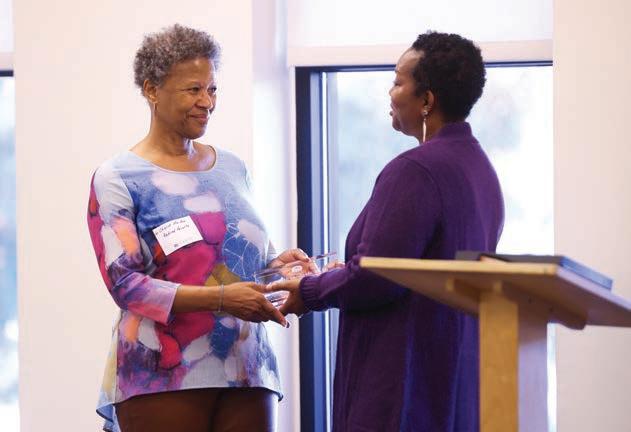
Cherie
recognized during the Black Alumni Council Reception and Awards ceremony during Homecoming 2021 after her retirement that year. When she began teaching at Furman in 1983, Maiden was one of the first two full-time Black professors at the university.
findings to faculty, staff and students. The results of this assessment will inform ongoing and future efforts to make Furman more diverse, equitable and inclusive. Key preliminary findings of the assessment include:
Points of progress
• Hiring a more diverse faculty.
• A solid infrastructure of diversity, equity and inclusive initiatives in place and a core group of people committed to advancing them.
• Students are leading DEI efforts among students and faculty.
• Professional development opportunities for faculty and staff, including conversations such as “Foundations of Anti-Racism.”
Areas to address
• Increasing diversity among administration and staff.
• Increasing messaging from top administrators that DEI is a priority for all divisions.
• Improving a sense of belonging and safety for BIPOC and LGBTQ+ students.
• Creating a vice president-level chief diversity officer to develop a campus wide strategy to continue Furman’s advancement in DEI.
Black Alumni Council
This past academic year was the inaugural year of the Black Alumni Council, composed of 17 alumni representing more than 50 years of graduates. Programming included events for alumni, students, faculty and staff to gather and build community. A particular highlight
was the council’s Black to Furman Welcome Weekend for students, faculty and staff. This will become an annual tradition.
For Black faculty and staff
The university also launched the Furman Black Faculty and Staff Association. It is intended to serve as an advocate and support group for the concerns of Black faculty, staff and students, while working to enhance their recruitment, retention and advancement. The group approved its bylaws in May and elected its first board in August. The association also:
• Provides a forum for addressing academic issues that affect Furman’s Black community.
• Improves the academic and work environment for Black faculty, administrators, staff and students and provides a networking and support system.
• Advises Furman’s leaders and community on their needs and concerns.
• Promotes diversity, equity and inclusion as important components of employment and academic pursuits.
• Establishes and maintains working relationships with university units, alumni, community groups, and Black faculty, administrators and staff at other local, regional and national institutions, and monitors and encourages diversity as an integral part of Furman’s mission.
For students
The Student Diversity Council is the umbrella organization for identity-based groups on Furman’s campus that include but are not limited to worldviews formed by race, ethnicity, gender, national origin, abilities, sexual orientation and religion. The council promotes awareness of cultural diversity at Furman and in the Greenville community.
26 PATHWAYS
Maiden, who was the Lois Aileen Coggins Professor of French, is
VP for DEI

“We are thrilled about the experiences these colleagues bring to the table, the energies that they will infuse into our curricula, and the many positive impacts their work will have on our students’ pathways.”
DEAN OF FACULTY JEREMY CASS ’00
Inclusive offerings
The LGBTQ+ Affairs Subcommittee, meanwhile, hosted the first-ever LGBTQ+ alumni homecoming brunch with plans to make it an annual event. Members of the subcommittee also visited Elon and Wake Forest universities to gather information about their extensive resources for LGBTQ+ students in hopes of establishing some of those same offerings at Furman.
New faculty, staff and administrators
As always, the search processes to recruit faculty for the 2021-2022 academic year placed the highest priority on inclusive excellence. The dean of faculty, in collaboration with members of the President’s Diversity, Equity and Inclusion Committee, reviewed each position request, advertisement, outreach effort and vetting procedure. Departments that conducted hiring searches participated in inclusive-search workshops, and candidates who were invited to on-campus interviews met with faculty and staff to discuss potential contributions to Furman’s DEI goals.
The university’s new faculty came from a variety of institutions and contexts in which they had demonstrated a deep commitment to excellent teaching and an eagerness to partner with undergraduate students in mentoring and research. The 2021 faculty hiring class reflected many kinds of diversity, a richness that will benefit student learning and curricula, while giving students the powerful and necessary experience of seeing themselves and some of their own lived experiences reflected in their professors and mentors.
The year brought a slate of other important hires, including Franklin Ellis, the new director of the Center for Inclusive Communities; the creation of the Associate Dean for Diversity, Equity, and Inclusive Excellence position, for which Professor of Communication Studies
Cynthia King was named; and other dedicated positions to support DEI in the Office of the Provost, Admissions and Student Life. The university also is undertaking a search for a new chief diversity officer and elevating the role to a vice president.
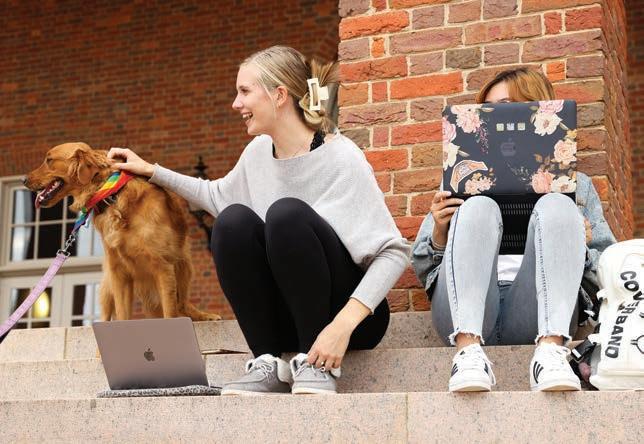
PATHWAYS 27
In fall 2021, Carson Kirby ’22 and Rosie Kim ’22 attend the LGBTQIA+ Sextacular! at the Joseph Vaughn Plaza.
EXCELLENCE AND COMMUNITY
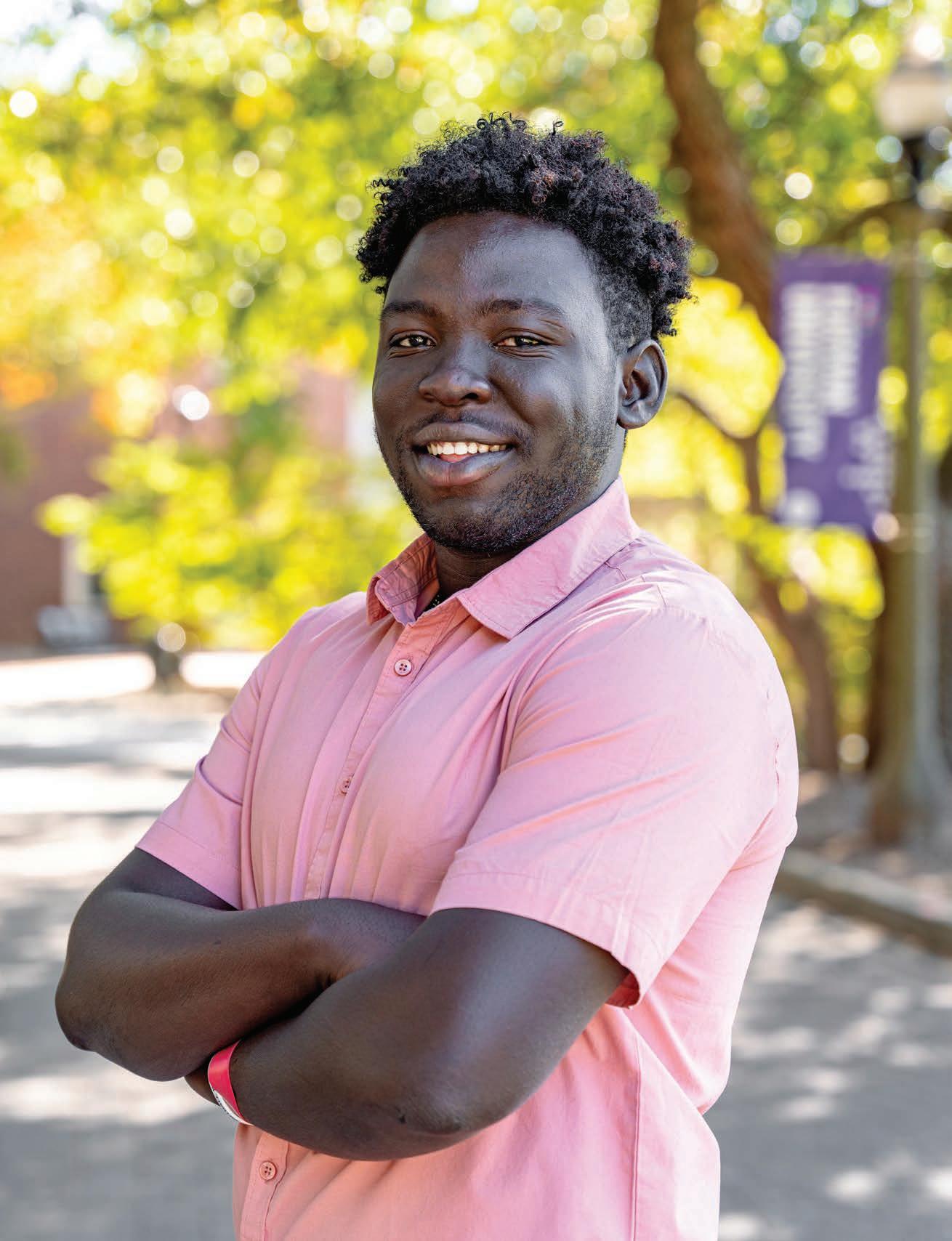
“Furman University has welcomed and empowered me to come out of my comfort zone. It has given me the power to make an impact by contributing to the cultural diversity in our community. ”
GRACCHUS FENELON ’24 President of the Furman University International Student Association
PATHWAYS 29
EXCELLENCE AND COMMUNITY
That first visit. A panel of current students sharing their experiences. A stay in a residence hall. And then? Summer Orientation and the embrace of community. A student’s individualized four-year journey starts well before their first Pathways class.
It is through these early interactions and impressions that The Furman Advantage starts to shape students’ trajectories by instilling in them a sense of belonging and encouraging self-reflection.
After receiving a record-breaking 7,175 applications, the university welcomed in Fall 2021 a new class of 656 students with sterling academic credentials and exceptional extracurricular accomplishments. The average SAT composite score for the entering class was 1334. Approximately 40% of these students were in the top 10% of their high school graduating class.
The substantial increase in high-quality applications allowed the university to admit more students while increasing academic quality and diversity.
The world’s future scholars
• In support of international student recruitment, Furman continued its partnership with United World College schools for the 2021-22 recruitment cycle. This included hosting virtual visits to all 18 UWC schools this year, as well as participating in in-person presentations and events with counselors, students and parents in Costa Rica, Mexico, the Netherlands, Armenia, Bosnia and Herzegovina, the United Kingdom, Switzerland, Germany, Italy and the United Arab Emirates.
• Furman hosted in-person and virtual workshops, webinars and presentations around the world through Council of International Schools, Education USA centers, as well as with individual high schools and independent counselors.
These virtual recruiting efforts were rewarding, and Furman saw a 30% increase in international applications for the Fall 2022 incoming class.
Admissions (Fall 2021 Entering Class)
APPLICATIONS: 7,175
ACCEPTANCES: 5,119
ENROLLED: 656
African American: 8.1%
Asian: 4%
Hispanic: 7.6%
White: 75%
Multiracial or other: 5.3%
International: 4%
Fall 2021
Total Enrollment
2,306
UNDERGRADUATE STUDENTS
Men: 40.2%
Women: 59.8%
African American: 7%
Asian: 3.4%
Hispanic: 5.8%
White: 76.7%
Multiracial or other: 7%
Total diversity: 23.3%
International: 3.4%
45 STATES REPRESENTED
35 COUNTRIES REPRESENTED
156 GRADUATE STUDENTS
AVERAGE CLASS SIZE: 14 STUDENT-TO-FACULTY
RATIO: 9:1
30 PATHWAYS
COST OF ATTENDANCE (2021-22) Tuition $52,992 Fees $380 Room (average) $8,274 Board (average) $6,200 Total Direct Costs $67,846
4,115 PROSPECTIVE STUDENTS/ FAMILIES ATTENDED IN-PERSON ON-CAMPUS EVENTS
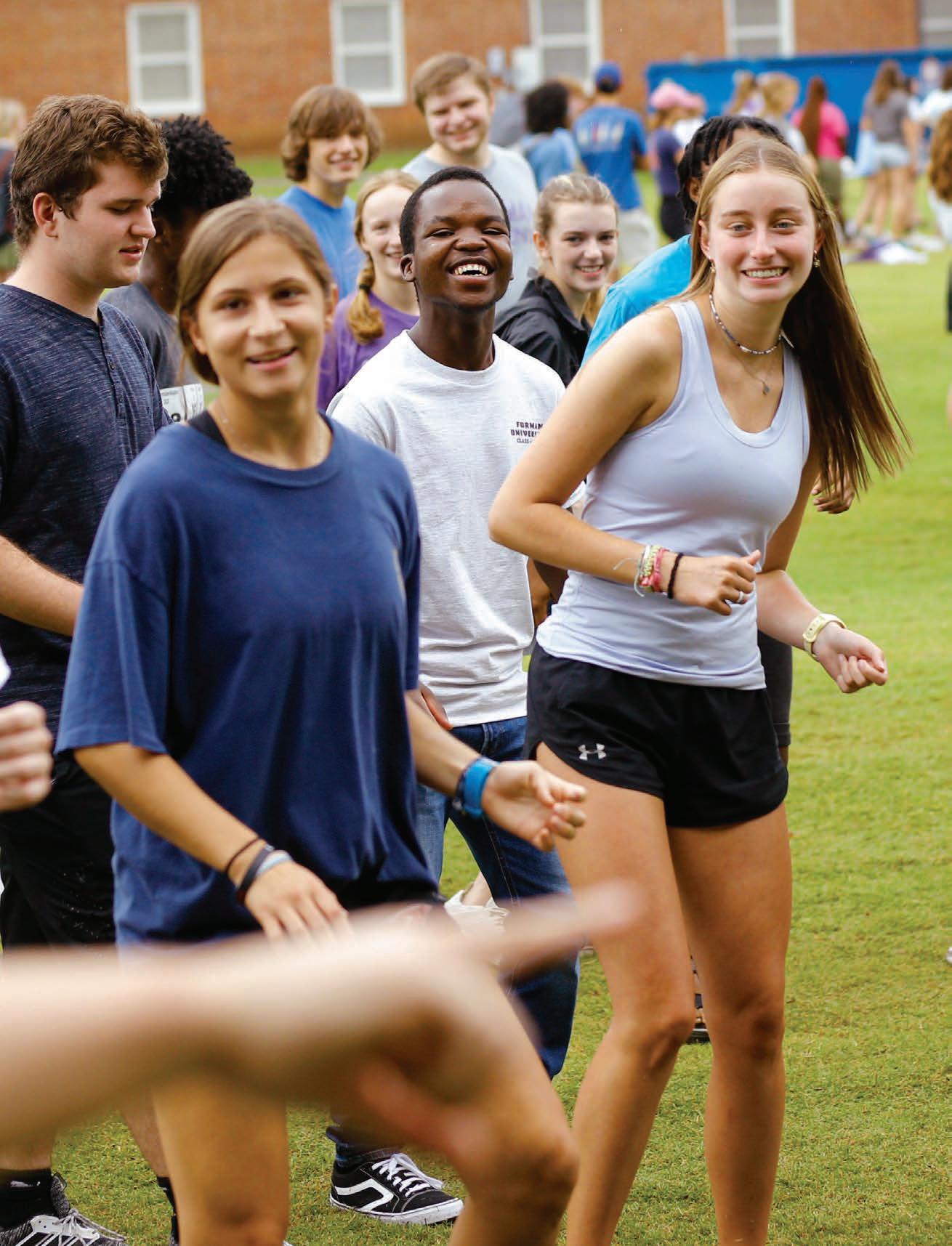
811 VIRTUAL AND IN-PERSON HIGH SCHOOL VISITS, COLLEGE FAIRS AND TRAVEL EVENTS WERE HELD
3,629 STUDENTS AND PARENTS ATTENDED VIRTUAL OR IN-PERSON RECRUITING EVENTS OFF CAMPUS
From left: Emily Berg ’25, Brian Mapakamise ’25 and Paige Van Ostenbridge ’25 during 2021 Orientation Fieldfest
THE CHANGE WE SEEK
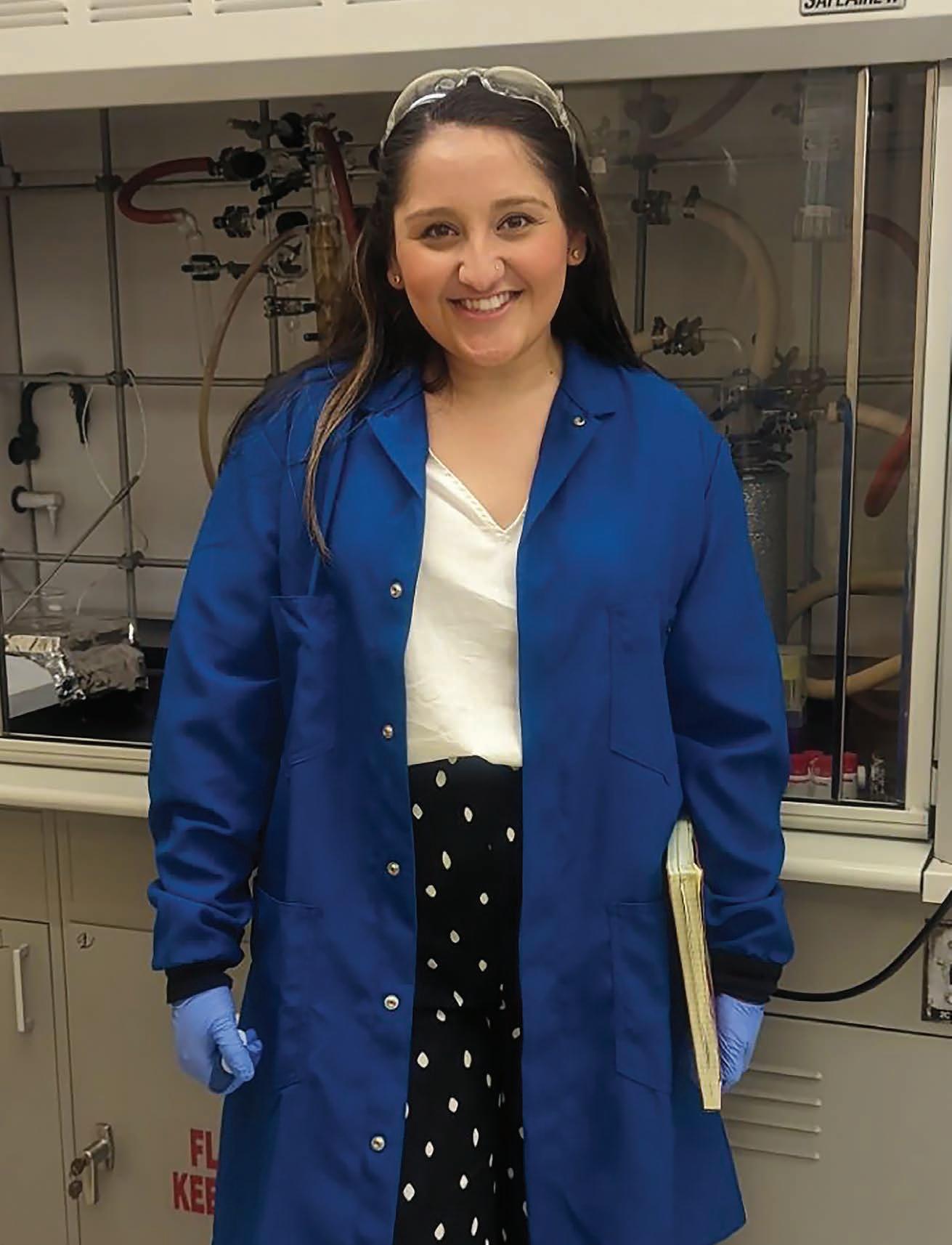
M ’21
Fabiola
Gonzalez ’19
Fabiola Gonzalez ’19 M ’21 began her pathway as a high school student in Bridges to a Brighter Future, a comprehensive college access and success program located at Furman. She went on to enroll at Furman, earning bachelor’s and master’s degree in chemistry. In Fall 2021, she entered a Ph.D. program at Florida State University.
PATHWAYS 33
THE CHANGE WE SEEK
Consider the impact. When students can see vividly and in real time how their work contributes to another person’s well-being, it helps them to define their pathway in a manner that reflects their values and reveals their interests.
Perhaps it was an internship at the local hospital. Or the hard work to weatherize a city resident’s home. Or maybe it was teaching students in the local elementary school.
These defining moments along a student’s pathway are found through the Cothran Center for Vocational Reflection, the Shucker Center for Leadership Development, the Malone Center for Career Engagement and the Furman Humanities Center. Furman’s institutes, too, offer abundant ways for students to personalize their pathway toward a life of purpose by making a positive impact on the community.
The four institutes form a collective of expertise and provide students with engaged learning opportunities and pathwaydefining experiences.
The Institute for the Advancement of Community Health (IACH) facilitates high-impact experiences for students to explore health-related careers. The institute conducts research of evidence-based interventions with community partners, while maintaining a commitment to health equity, justice and diversity.
Furman students who participate in IACH programs, courses and experiences can map a unique, guided journey to a career in health. Their individualized pathways prepare them to enter and influence health professions with a comprehensive understanding of the challenges and focused solutions.
More than 200 students from 27 majors were mentored by IACH faculty and staff this year. Many built upon previous institute experiences to do internships that broadened their understanding of how housing, education, neighborhood and access to food impact health outcomes of individuals and communities. Through the Faith in the Vaccine Ambassador Program, students learned to work with community partners to build confidence in the COVID-19 vaccine and promote well-being. During the first May Experience offering of Global Health and Medicine in Portugal, students gained more than 40 clinical observation hours while learning about the local health care system.
Through the annual Community Health Forum, community members, faculty, clinicians and students learned how to create healthy communities for older adults. Anne Tumlinson ’89, CEO of ATI Advisory and an IACH Leadership Council member,
MORE THAN 200 STUDENTS FROM 27 MAJORS WERE MENTORED BY IACH FACULTY AND STAFF THIS YEAR.
34 PATHWAYS
was the event’s keynote speaker. IACH continues to advocate for older individuals through the grantfunded Community Cares Program in partnership with PRISMA Health, supporting high-risk seniors in need of social support. The Medical Legal Partnership wrapped up a three-year grant, which expanded service to geriatric patients. Results from the expansion indicate that 89.5% were helped by MLP services.
The Hill Institute for Innovation and Entrepreneurship helps launch successful ventures. Now in its fourth year, the institute develops innovative and entrepreneurial leaders, grows an innovative community at Furman, and contributes to the local and regional entrepreneurial ecosystem.
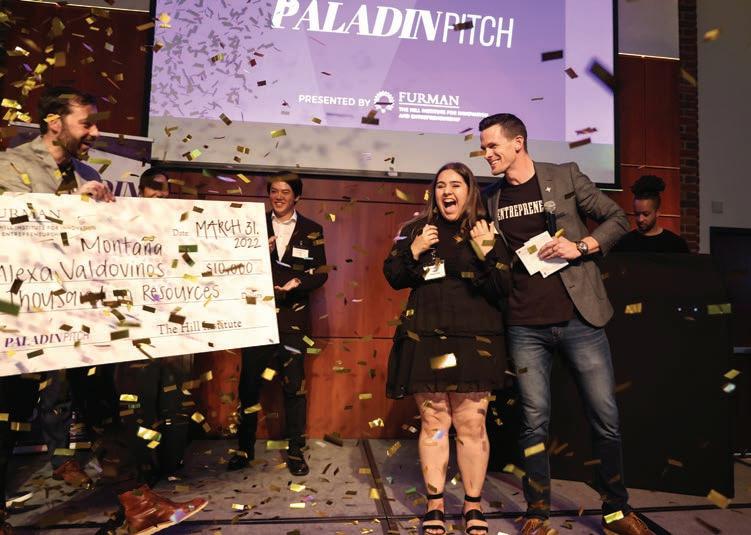
Through pitch competitions, mentoring, internships, speakers, co-working spaces, boot camps and workshops, The Hill Institute provides students a platform to envision, test and launch their social and entrepreneurial ventures. This is achieved through partnerships with the S.C. Department of Commerce, the City of Greenville, Village Launch, NEXT and angel investor group VentureSouth. The institute’s third annual Summer Business and Innovation Boot Camp has now enrolled more than 83 students, including 25 in the past year, representing 13 universities.
The institute also launched GVL Starts, an eight-week experience offering community members the training, network, resources and capital to launch ventures. Of 53 graduates, more than half were women or members of underrepresented groups. The institute also launched the Clemens Angel Analyst Fellowship in partnership with VentureSouth with a $1 million gift. The fellowship will provide up to 15 students each year with the skills, experience and network necessary to launch successful careers in angel investing, venture capital and private equity or to raise capital for their startup venture.
The Hill Institute expanded Furman’s presence into downtown Greenville with a 2,000-square-foot space on the ground floor of 101 N. Main St. in One City Plaza. Know as Furman 101, it is shared by the institutes and the university, and connects students and faculty with the business and nonprofit community to create a pipeline of talent for internships, jobs, research and collaborations, while also delivering diverse experiences for lifelong learners.
The Riley Institute at Furman broadens student and community perspective about issues critical to South Carolina’s progress, builds and engages present and future leaders, and creates and shares datasupported information about the state’s core challenges.
This year, The Riley Institute launched the Public Media Diversity Leaders Initiative, which provides practitioners from across the nation with tools to champion diversity, equity and inclusion in their workplaces. It is modeled after the institute’s South Carolina Diversity Leaders Initiative, which graduated its 2,500th participant in May.
PATHWAYS 35
Alexa Valdovinos ’25 and Bryan Davis, executive director of The Hill Institute, during the Paladin Pitch, a competition for aspiring entrepreneurs, in 2022. Valdovinos was this year’s top winner.
The institute also launched South Carolina Afterschool Leaders Empowered, funded with $1.3 million from the state Department of Education, which focuses on growing and improving afterschool and summer learning programs in South Carolina. The institute’s research consultancy added about $800,000 in multi-year contracts to its portfolio.
The Riley Institute also added two new awards events. The inaugural Building OneSouthCarolina forum highlights a collaborative community achievement. The new Lowcountry Diversity Leadership Awards, presented in partnership with the Charleston Regional Business Journal, expands Furman’s footprint to the state’s southern coast.
On campus, the institute continued to offer meaningful opportunities to students. It sent four students to the APEC Voices of the Future Summit 2021, which was hosted virtually by New Zealand, as the sole youth delegation from the United States. The institute also hosted events focused on issues such as structural racism and foreign relations in a changing world, with the support of its Advance Team, a select group of students interested in politics and public policy.
The institute’s three centers focus on education, applied research and leadership through a variety of programs.
Furman’s fifth STARS report earned a gold sustainability rating from the Association for the Advancement of Sustainability in Higher Education, placing Furman at No. 3 among all baccalaureate institutions and representing the only school in the South. The National Association of College and University Business Officers recognized the institute’s Community Conservation Corps with its Excellence in Sustainability Award. And the institute continues to work on community climate resilience as a partner on a National Oceanic and Atmospheric Administration-funded research grant, the Carolinas Collaborative on Climate, Health, and Equity.
– Senior Survey results for the class of 2021
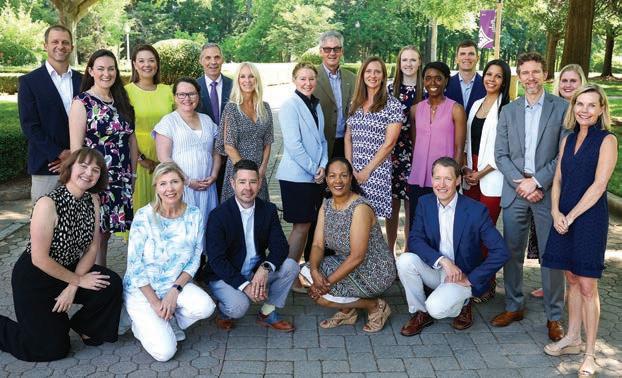
The Shi Institute for Sustainable Communities is a regionally centered, community-focused hub that promotes sustainable human flourishing and recognizes the interdependence between social and equity challenges and environmental issues. The Shi Institute connects campus and community to the work of developing sustainable communities.
The Shi Institute’s Student Fellows program provided 31 students with hands-on campus and community experience. Students in the Community Conservation Corps weatherized 11 additional homes, and the institute assisted the City of Greenville in writing its first comprehensive sustainability plan. The institute’s research team completed important work exploring the impacts of historic racially restrictive covenants in property deeds, indicators of food insecurity, and eviction distribution in Greenville County. The Sustainability Leadership Initiative, a partnership with Sustain SC, graduated its first class of 23 participants, statewide professionals who now possess the knowledge and network to advance sustainability in their fields.
The Malone Center for Career Engagement
Often extending a student’s pathway – and making an impact – means getting that first job. Through the Purposeful Pathways initiative of The Furman Advantage, the Malone Center, in collaboration with Academic Affairs, worked with Furman’s academic departments to deliver major-specific professional development programming to students.
The center relaunched the Career Trek program after a two-year pause due to the pandemic. Twenty-eight students traveled to New York City to visit Bank of America, MUFG, U.S. News & World Report, Gladstone Place Partners and other employers.
36 PATHWAYS
2022 Sustainability Leadership Initiative graduates
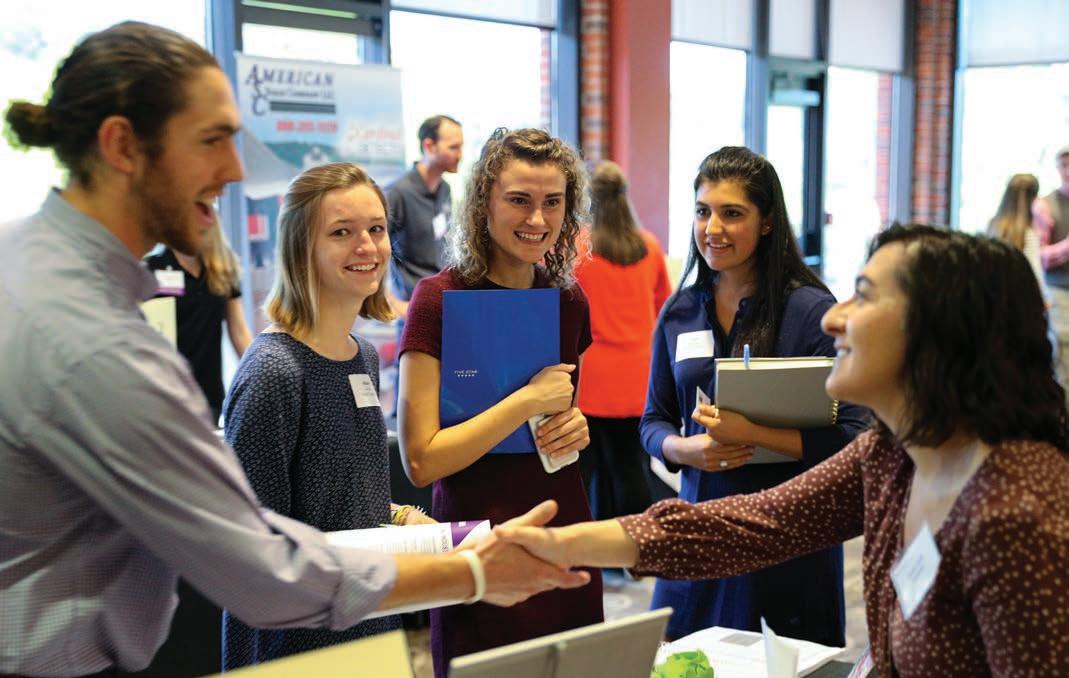
The center increased its engagement with student-athletes by 33%. It achieved this through a variety of outreach efforts, including Monday evening appointments for student-athletes, the Alumni StudentAthlete Career Panel and professional development programming delivered to nine athletics teams.
The Malone Center also:
• Held 822 career advising appointments, hosted 236 students at the Fall Opportunity Fair, connected students with 180 employers, and delivered 61 classroom presentations.
• Organized a Beyond Diversity Networking Night to connect students with alumni from similar backgrounds.
• Provided 145 professional LinkedIn headshots and posted 62,195 jobs on Handshake.
• Connected more than 100 alumni with Furman students.
Graduate Studies
Furman Graduate Studies extends The Furman Advantage into the postgraduate realm, connecting students with department mentors and industry experts while introducing them to professional learning environments. Through networks of professional connections and partnerships, each graduate program continues student pathways into meaningful
careers within high-impact areas in the communities they serve.
The Master of Arts in Strategic Design trains students to be creative leaders in a world where business and design collide. Combining mentoring and instruction from Furman’s business, communication studies and art departments, the program develops student innovation and creativity.
The Master of Science in Community Engaged Medicine gives students an advanced understanding of science and population health related to the gap between a community’s medical needs and resources.
The Master of Science in Chemistry extends the broad introductory curriculum of the Bachelor of Science requirements to the master’s level and helps undergraduates get involved earlier and more extensively in research.
Finally, Furman’s graduate programs in education – the Master of Arts in Education, Master of Arts in Teaching, and Educational Specialist degree – serve as a critical hub of educator support in Upstate South Carolina. Boasting a teacher retention rate of 96% after five years in the field, Furman positions students to convert their dedication to education into a long-term career in teaching.
PATHWAYS 37
Students meet with employers at the 2021 Malone Center Opportunity Fair.
WITH EVERY MILE
The pathway of a student-athlete is shaped by mentoring and coaching, a sense of belonging to something bigger than oneself, and by discipline and a yearning to win – priming each studentathlete for meaningful lives after college.
The support from alumni is a powerful component in this environment. In a variety of ways, alumni help to ensure that future classes can pursue their goals and continue their individual pathways to success. In November 2021, Chris ’78 and Andrea Borch and their foundation gave a $5 million gift to establish an endowment for cross-country and track and field scholarships. And this past February, the university dedicated the new Davis and Faxon Training Facility at REK, a 100% donor-funded project designed to position Furman’s golf programs to compete at the highest levels. Men’s soccer alumni, too, have raised money to endow the program, including a scholarship gift from Major League Soccer player Walker Zimmerman ’15 and his wife Sarah Tucker Zimmerman ’15.
At the highest levels
• 3 NCAA Team Tournament Qualifiers
• 6 Southern Conference Player of the Year awards
• 5 Southern Conference Championships
• 2 Southern Conference Coach of the Year awards:
– Robert Gary, Men’s Cross-country
– Robert Gary, Women’s Cross-country
Women’s tennis ranked as high as 19th nationally, a program record, after defeating No. 26 Alabama and 24th-ranked Texas Tech at the Blue Gray Tournament. Furman concluded the 2022 season with a 22-7 overall record and claimed the Southern Conference’s automatic bid to the NCAA tournament by capturing its 21st SoCon Championship. The Paladins, who made their 14th appearance in the NCAA tournament, were led by SoCon Player of the Year Julia Adams ’22, who ranked 38th nationally.
Furman’s cross-country teams won their ninth consecutive SoCon Championships in Fall 2021. Bethany Graham ’24 was honored as the SoCon Female Runner of the Year and earned an AllAmerican citation at the NCAA Championships. Cameron Ponder ’22, the SoCon Male Runner of the Year, helped the Paladin men, who ranked as high as 10th nationally, to a secondplace finish at the NCAA Southeast Region Championships and an automatic bid to the NCAA Championships.
Women’s basketball posted its first 20-win season since 2000, and small forward Tierra Hodges ’22 was named consensus SoCon Player of the Year. Men’s basketball coach Bob Richey became the first Paladin men’s basketball coach to record four seasons with 20 or more victories and the fastest coach in program history to reach 100 career victories.
FURMAN’S CROSS-COUNTRY TEAMS WON THEIR NINTH CONSECUTIVE SOCON CHAMPIONSHIPS IN FALL 2021.
38 PATHWAYS
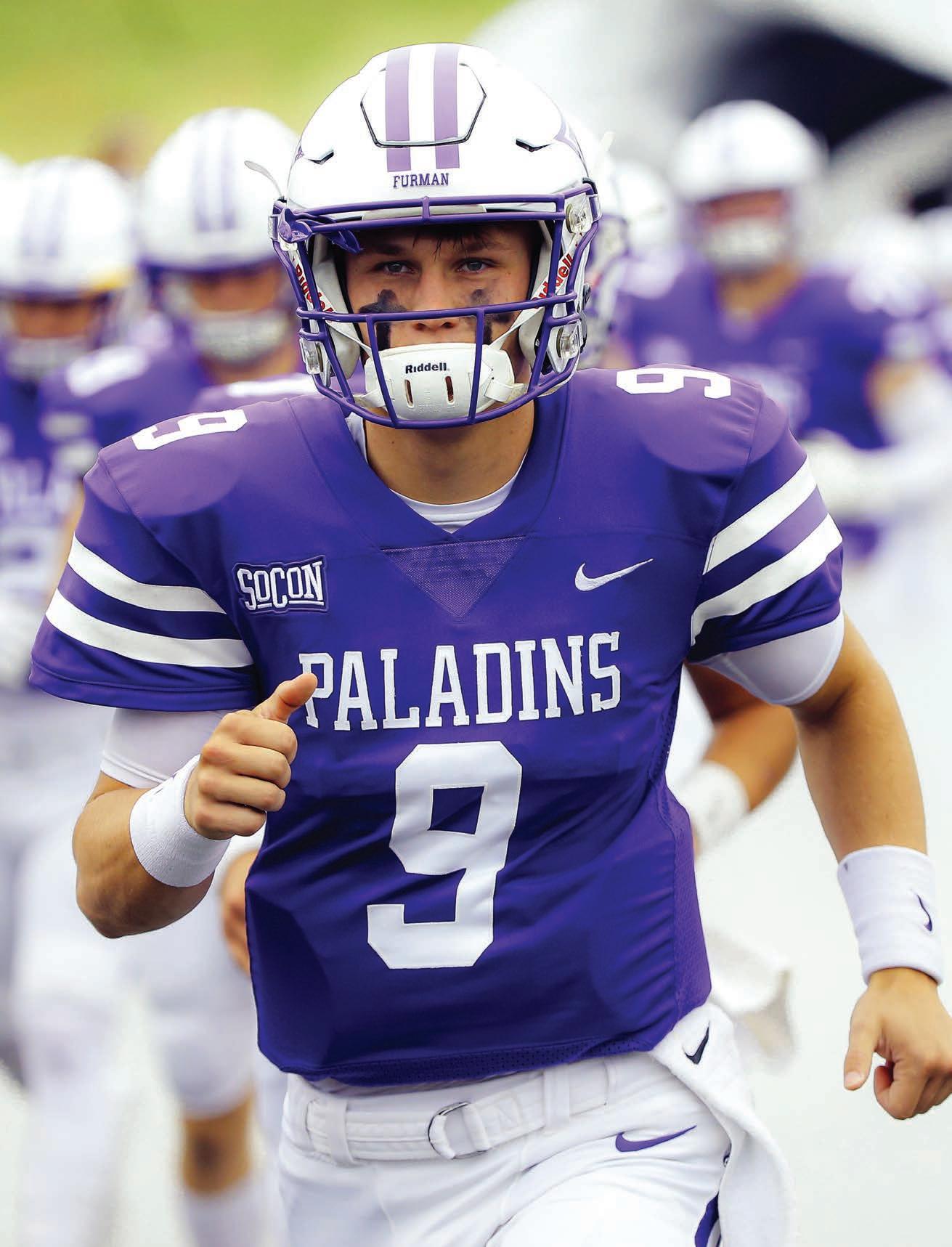 Hamp Sisson ’22
Hamp Sisson ’22
18
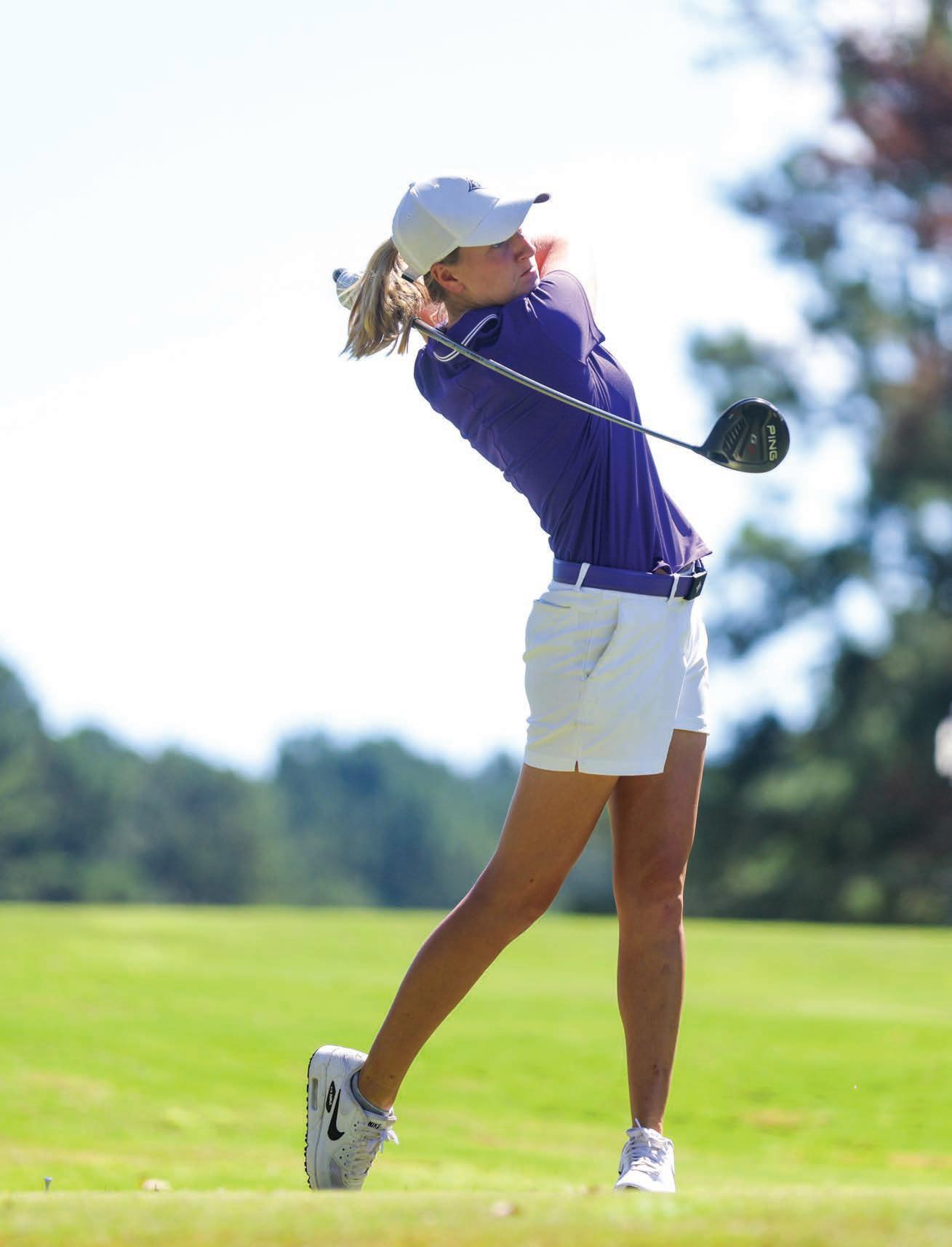
325 STUDENTATHLETES
5 DIVISION I TEAMS SOCON CHAMPIONSHIPS IN 2021
Anna Morgan ’23 was voted the SoCon Female Athlete of the Year.
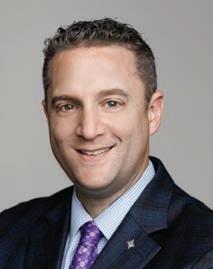
“This past year was another special year for the Paladins. We are proud of the continued success, accomplishments and commitment to excellence by our student-athletes, coaches and teams.”
VICE PRESIDENT FOR INTERCOLLEGIATE ATHLETICS
JASON DONNELLY
The 2021-22 school year brought a slate of former Paladins earning Hall of Fame status. Furman football coaching legend Dick Sheridan was enshrined in the National Football Foundation in Las Vegas. Clint Dempsey ’05 was inducted into the National Soccer Hall of Fame. Basketball great Clyde Mayes ’75 was enshrined into the Southern Conference Hall of Fame. And Furman basketball All-American Frank Selvy ’54 was among nine greats elected for induction into the National Collegiate Basketball Hall of Fame in November.
ALL-AMERICANS
BETHANY GRAHAM ’24, CROSS-COUNTRY
RYAN MILLER ’22, FOOTBALL
CAMERON PONDER ’22, INDOOR TRACK & FIELD
MEGAN MARVIN ’24, OUTDOOR TRACK & FIELD
CARSON WILLIAMS ’24, OUTDOOR TRACK & FIELD
ANNA MORGAN ’23, GOLF
Exceptional achievements
• 2nd in Commissioner’s Cup, Men’s Teams
• 2nd in Germann Cup, Women’s Teams
• Women’s golfer Anna Morgan ’23 was voted the SoCon Female Athlete of the Year after finishing ninth at the NCAA Championships. A Women’s Golf Coaches Association All-American, she concluded the season ranked 16th nationally. Morgan, who helped lead the Paladins to the SoCon Championship and the Lady Paladin Invitational title, tied for 21st at the 2022 Augusta National Women’s Amateur, qualified for the U.S. Women’s Open, and competed on the U.S. Team in the Arnold Palmer Cup.
• Cameron Ponder ’22 earned an All-America citation in the 3,000m for indoor track for the second straight season after finishing 11th with a time of 8:03.99 at the NCAA Championships, where the top eight finishers were separated by less than a second. Ponder, who holds four career sub-4:00 mile marks, was named the 2021 SoCon Cross Country Men’s Runner of the Year, earned All-Southeast Region accolades, and then competed at the NCAA Cross Country Championships.
PATHWAYS 41
A WORLD OF GOOD
 Cameron Ponder ’22 competes at NCAA Championships in 2019.
Cameron Ponder ’22 competes at NCAA Championships in 2019.
“It opened the door not only to a great education, but being on the track team was the beginning of learning some lessons that have just been invaluable to me in every aspect of my life.”
CAMERON PONDER ’22 was able to pursue his dreams to compete nationally and study at Furman because of a track scholarship established by Chris Borch ’78, his wife, Andrea, and the Borch Foundation.
PATHWAYS 43
A WORLD OF GOOD
“Furman meant an open door to a dream.”
These words, shared recently by a Furman alumna, affirmed the work of our faculty, staff, students and alumni. Gathered as part of a collection of alumni stories, this simple yet moving statement says everything. The idea of open doors and ambitious dreams speaks to the fundamental purpose of philanthropy. In challenging times, the optimistic act of philanthropy is what stirs our dreams and feeds our spirit.
The philanthropy from Furman’s supporters, along with the work of the university’s investment office and a robust market, has helped fuel significant growth in Furman’s endowment. The numbers reflected in fiscal year 2022 are evidence of that success. They are impressive. Fiscal year 2022 saw Furman raise more than $43.5 million from more than 10,000 donors, including:
• 1,700 first-time donors.
• A 53% giving participation rate from the Class of 2022.
• A 44% giving participation rate from employees.
• The creation of 29 new scholarships.
These numbers tell a remarkable story of impact. Every number represents the
dream of a Furman student to heal, to teach, to perform, to research, to produce, to analyze, to compete, to belong, to lead, and to change their community and the world. Every gift our supporters made this past year to Furman and every endowment dollar that grew as a result throws doors open for Furman students, propels them through those doors, and ultimately inspires them to realize their dreams for the benefit of us all.
The year also saw the commitment of multiple transformational gifts. Robert ’83 and Margaret Hill ’83 supported Furman’s Institute for Innovation and Entrepreneurship with an endowment fund. To recognize that commitment, the institute was renamed The Robert and Margaret Hill Institute for Innovation and Entrepreneurship.
CHRIS ’78 AND ANDREA BORCH AND THE BORCH FOUNDATION GAVE $5 MILLION TO ESTABLISH AN ENDOWMENT TO PROVIDE CROSS-COUNTRY/TRACK AND FIELD SCHOLARSHIPS.
44 PATHWAYS
ENDOWMENT POOL AND TOTAL ENDOWMENT TOTAL ENDOWMENT
The university endowment provides a significant source of revenue that supports the operations and programs of the university. As of June 30, 2022, Furman’s total endowment was valued at $812 million, of which $606 million was invested in the endowment pool (the portion under the decision-making authority of the university). The remainder of the endowment is separately invested or managed by other entities, e.g., The Hollingsworth Funds.
ENDOWMENT DISTRIBUTION
$32.5
TOTAL ENDOWMENT DISTRIBUTED
During the 2021-2022 fiscal year, approximately $32.5 million was distributed from the total endowment. These monies, along with other distributions from university working capital, contribute approximately 20.7% of the university’s annual budget.
PATHWAYS 45
$200M $400M $600M $800M $300M $500M $700M $900M FY12FY13FY14FY15FY16FY17FY18FY19FY20FY21FY22
ENDOWMENT POOL
Departmental, library, programs, other 21% Scholarships 47% Professorships 11.0% Facilities, operation, maintenance, improvement 12% Unrestricted budget support 9.0%
ASSET ALLOCATION Hedged strategies 16% Private equity/ Venture 27% Real assets/ Natural resources 11% International equities 18% Fixed income 7.0% U.S. equities 16% Cash 5.0%
M
$40,183
AVERAGE FINANCIAL AID PACKAGE
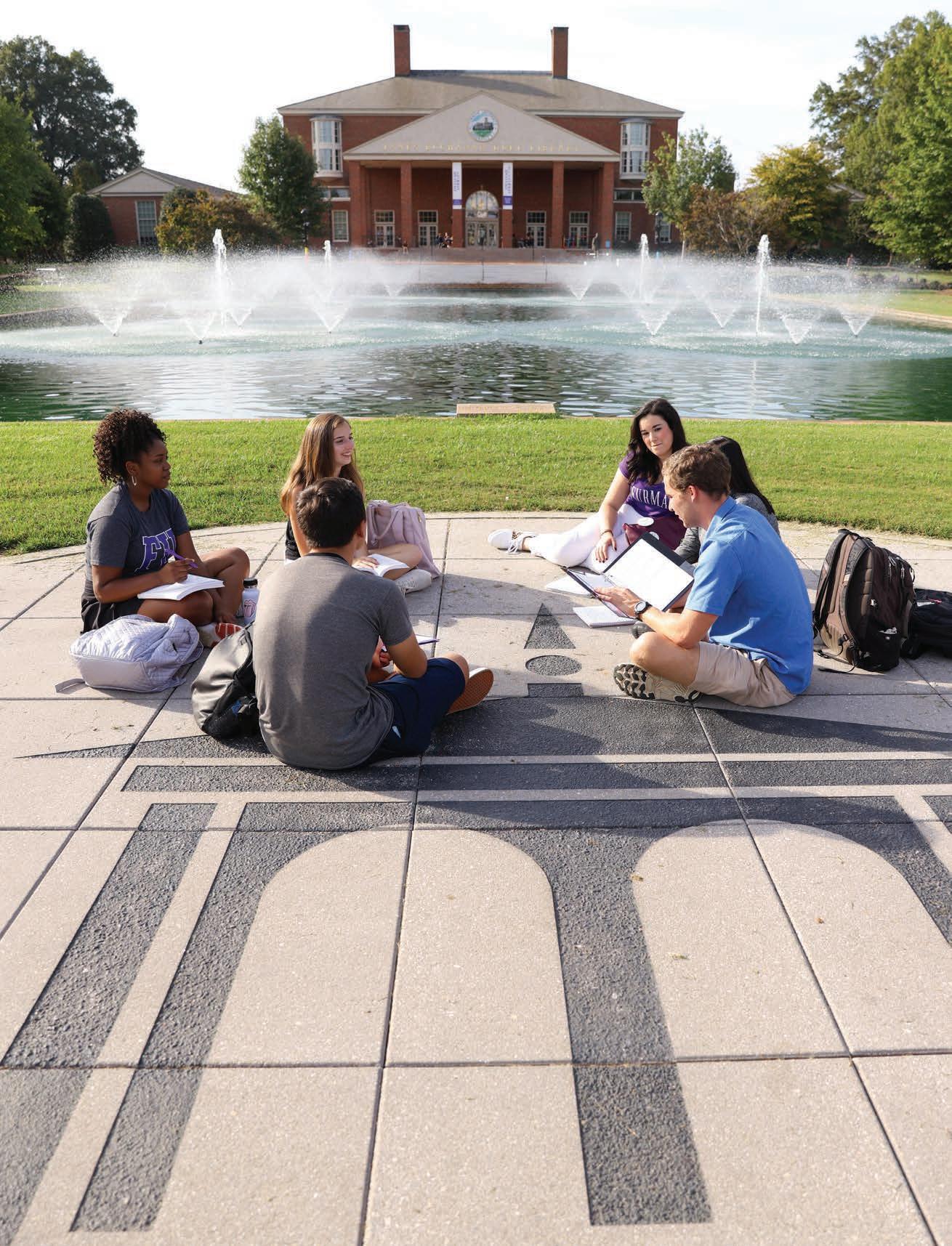
90.2% OF STUDENTS RECEIVED SOME FORM OF FINANCIAL AID
$69,900,722
TOTAL FINANCIAL ASSISTANCE FURMAN AWARDED TO STUDENTS
Students gather on Milford Mall.
Furman’s mission is to challenge and support lifelong learners through deep inquiry, transformative experiences, and meaningful reflection, all of which lead to lives of meaning and consequence. Meeting our mission is more important than ever, and you and your philanthropic investment in Furman inspire our work. Thank you for opening doors and dreaming with us.
Willie Cornish’s creative pathway started even before college, when he was composing music as a young teen. At Furman, he gave the tuba a try during the pandemic to help round out an ensemble. He eventually won the Mattie Hipp Cunningham Scholarship and an honorable mention in the New York Youth Symphony’s First Music competition. After graduating this past spring, Cornish began a master’s composition program at the University of Michigan – for which he earned a full scholarship. He hopes to pursue a career in commercial composition for TV or movies and eventually to teach composition.

furman.edu
© 2022 Furman University. Furman University does not unlawfully discriminate on the basis of race, color, national origin, sex, sexual orientation, gender identity, disability, age, religion, veteran status or any other characteristic or status protected by applicable local, state or federal law in admission, treatment, or access to or employment in, its programs and activities.
 Furman University
2022 President’s Report
Furman University
2022 President’s Report




 President Elizabeth Davis
President Elizabeth Davis


 Michelle Horhota, Associate Dean for Mentoring and Advising, Professor of Psychology
Michelle Horhota, Associate Dean for Mentoring and Advising, Professor of Psychology



 © 2022 Furman University
© 2022 Furman University







 From left: Oscar Guillen Arauz ’22 and Emily Miller ’22 celebrate being first-generation students during Furman’s first-generation and low-income students GEN Week in April. The week was observed nationally across many universities dedicated to celebrating first-gen pride and raising awareness and visibility of first-gen, low-income students.
From left: Oscar Guillen Arauz ’22 and Emily Miller ’22 celebrate being first-generation students during Furman’s first-generation and low-income students GEN Week in April. The week was observed nationally across many universities dedicated to celebrating first-gen pride and raising awareness and visibility of first-gen, low-income students.










 Hamp Sisson ’22
Hamp Sisson ’22


 Cameron Ponder ’22 competes at NCAA Championships in 2019.
Cameron Ponder ’22 competes at NCAA Championships in 2019.

